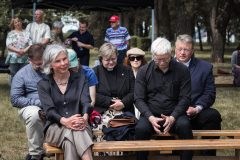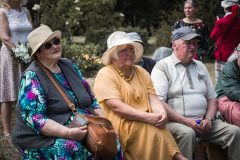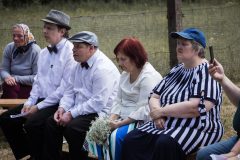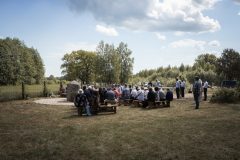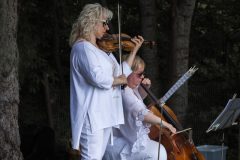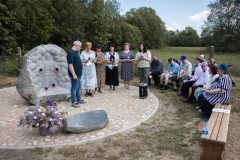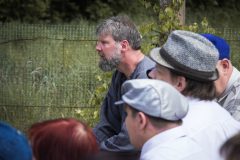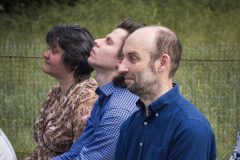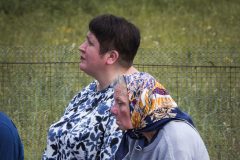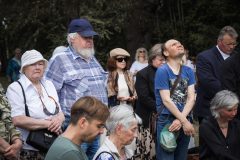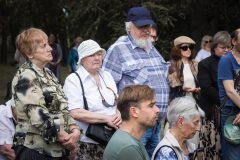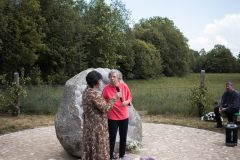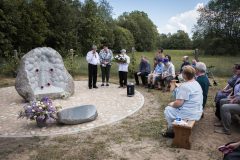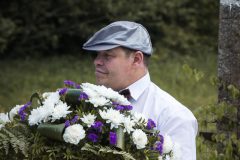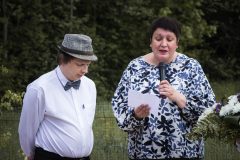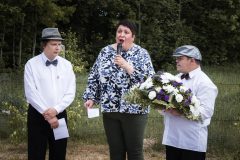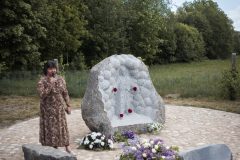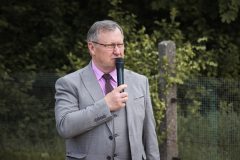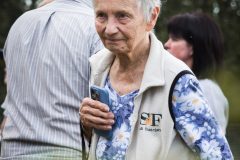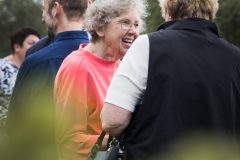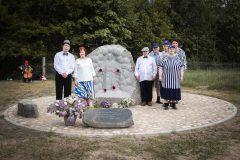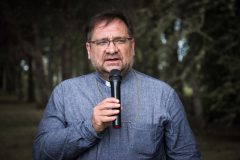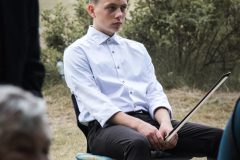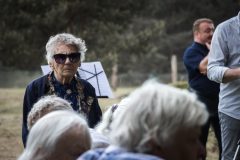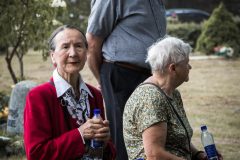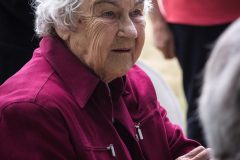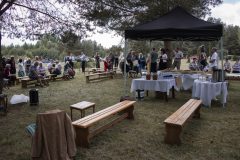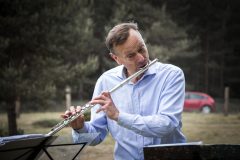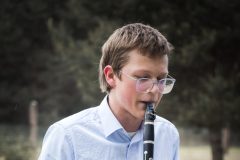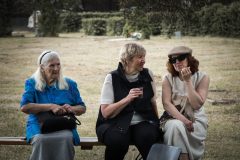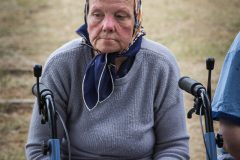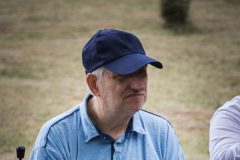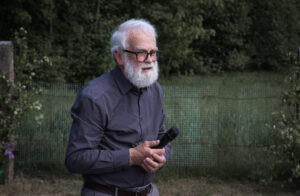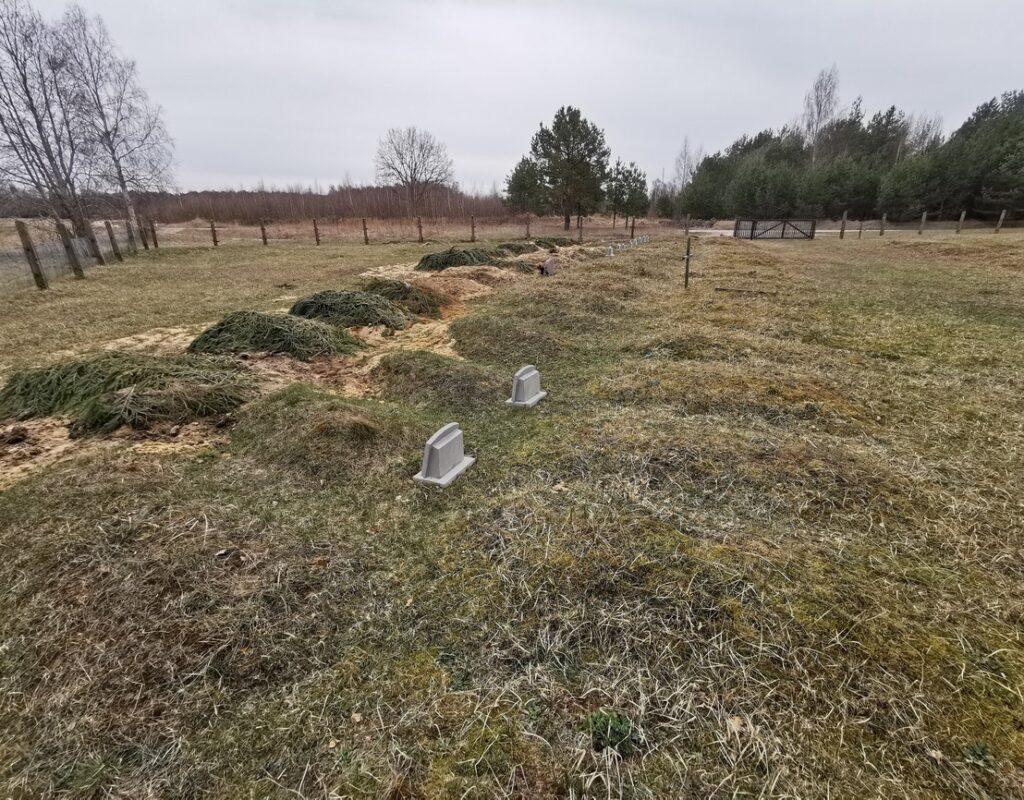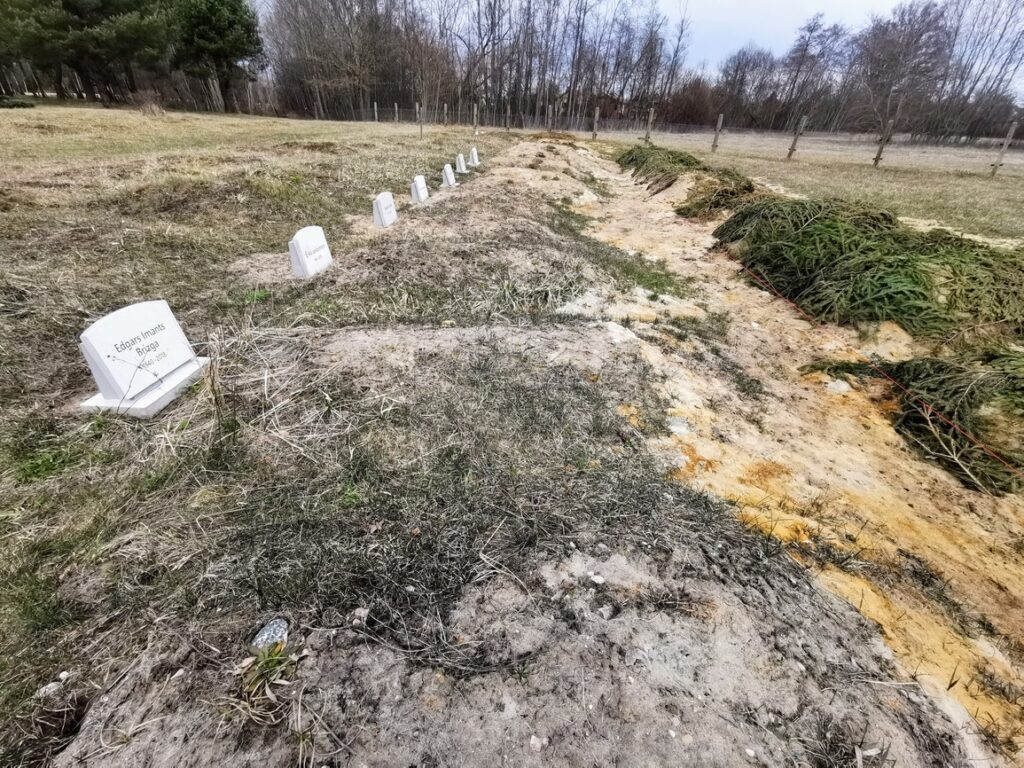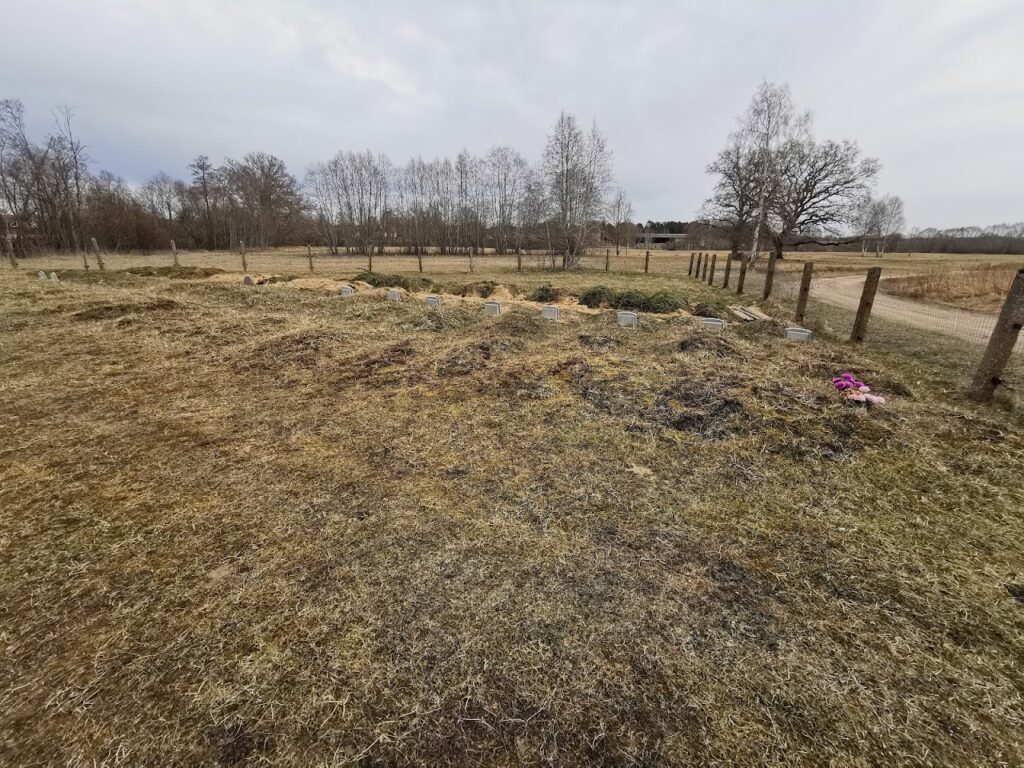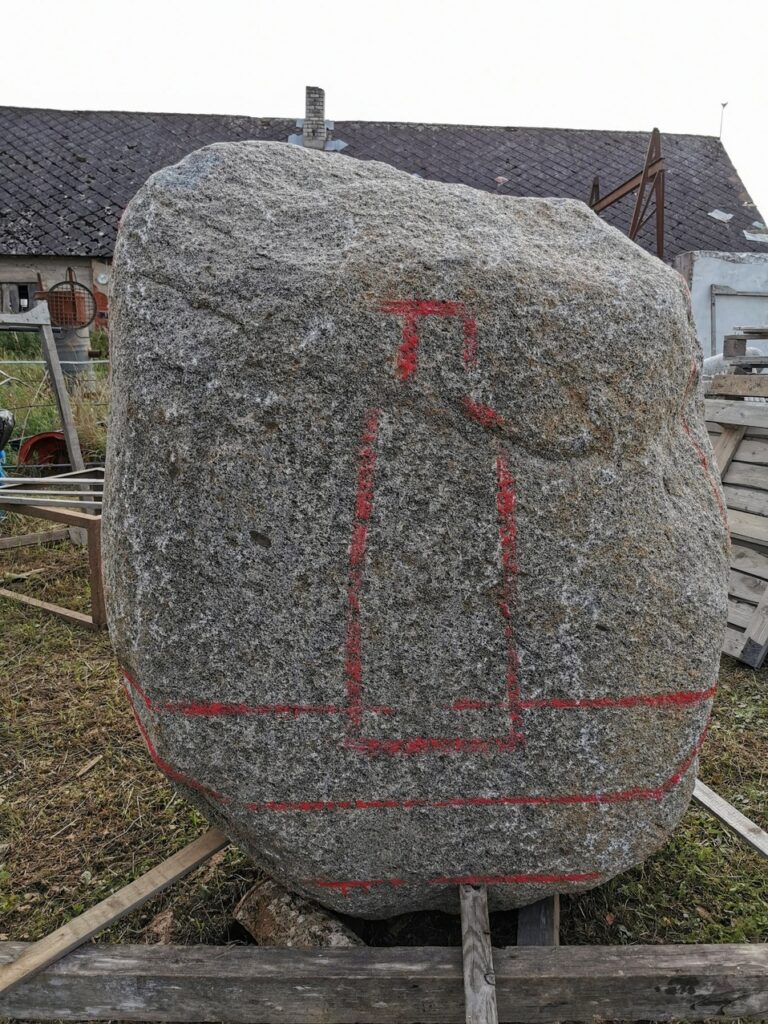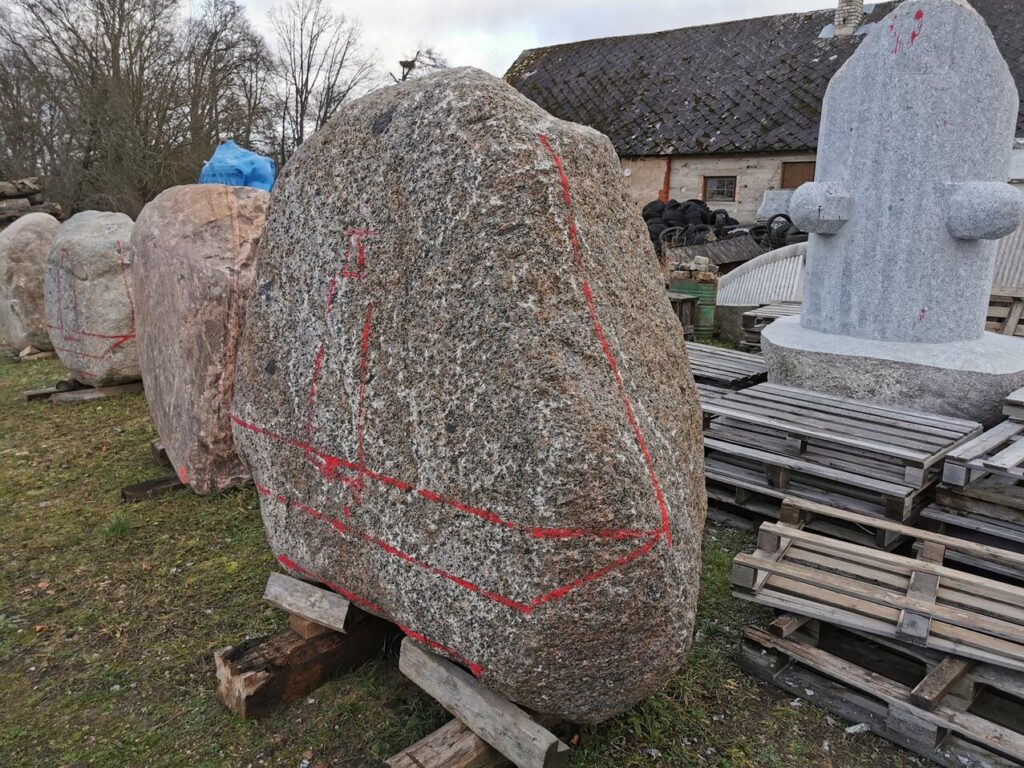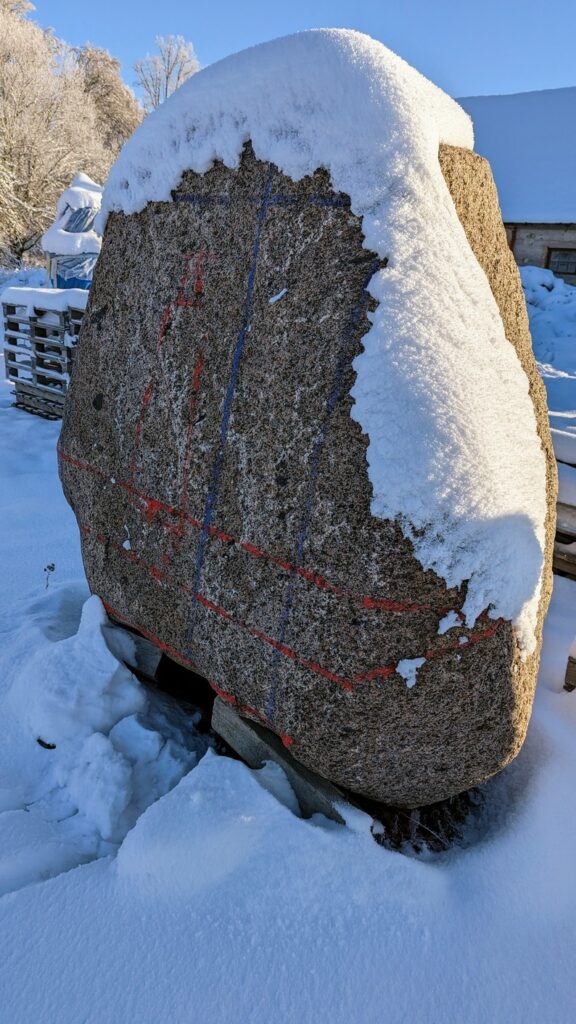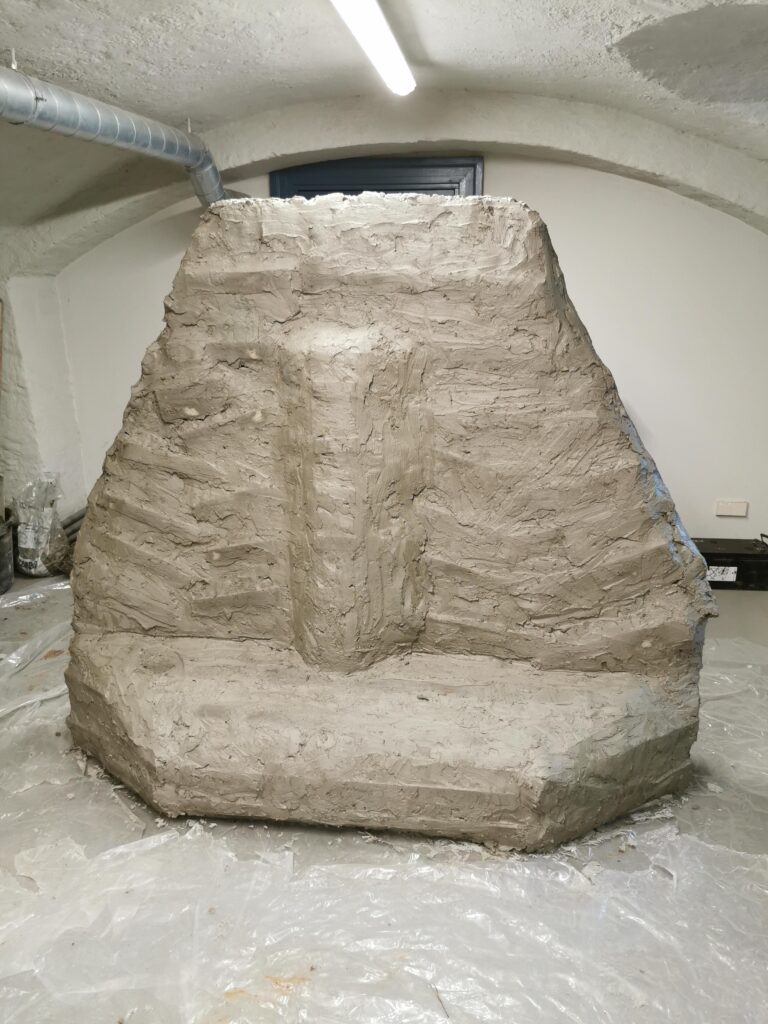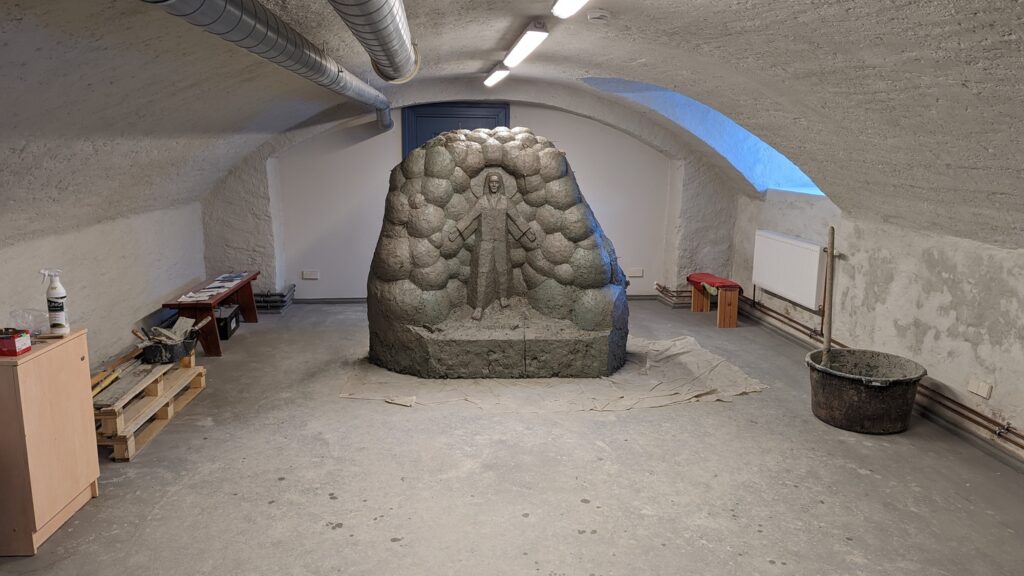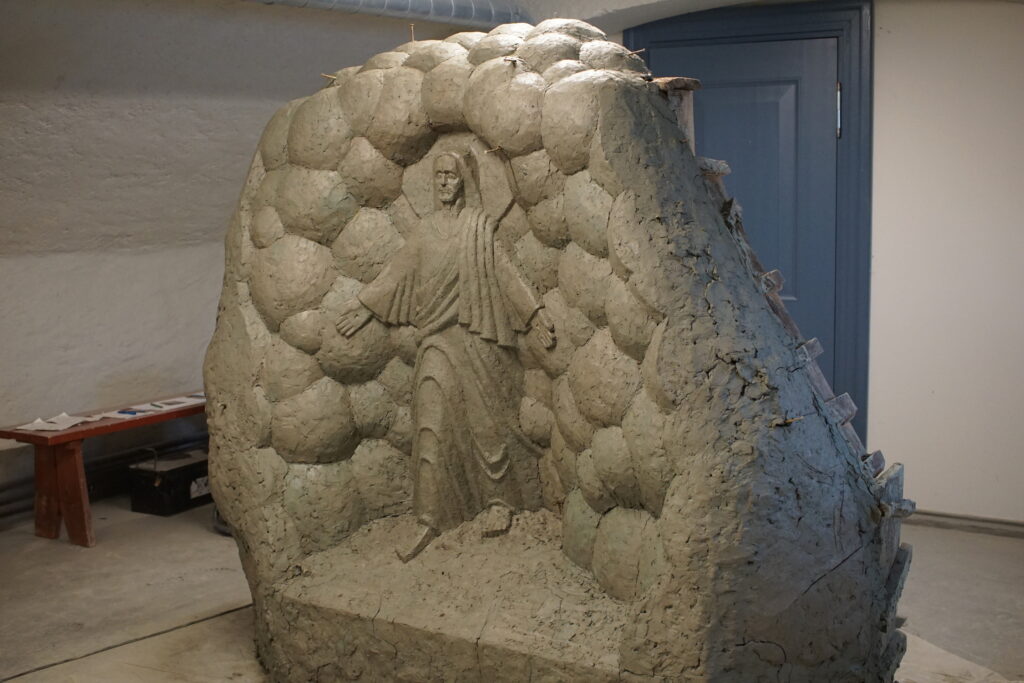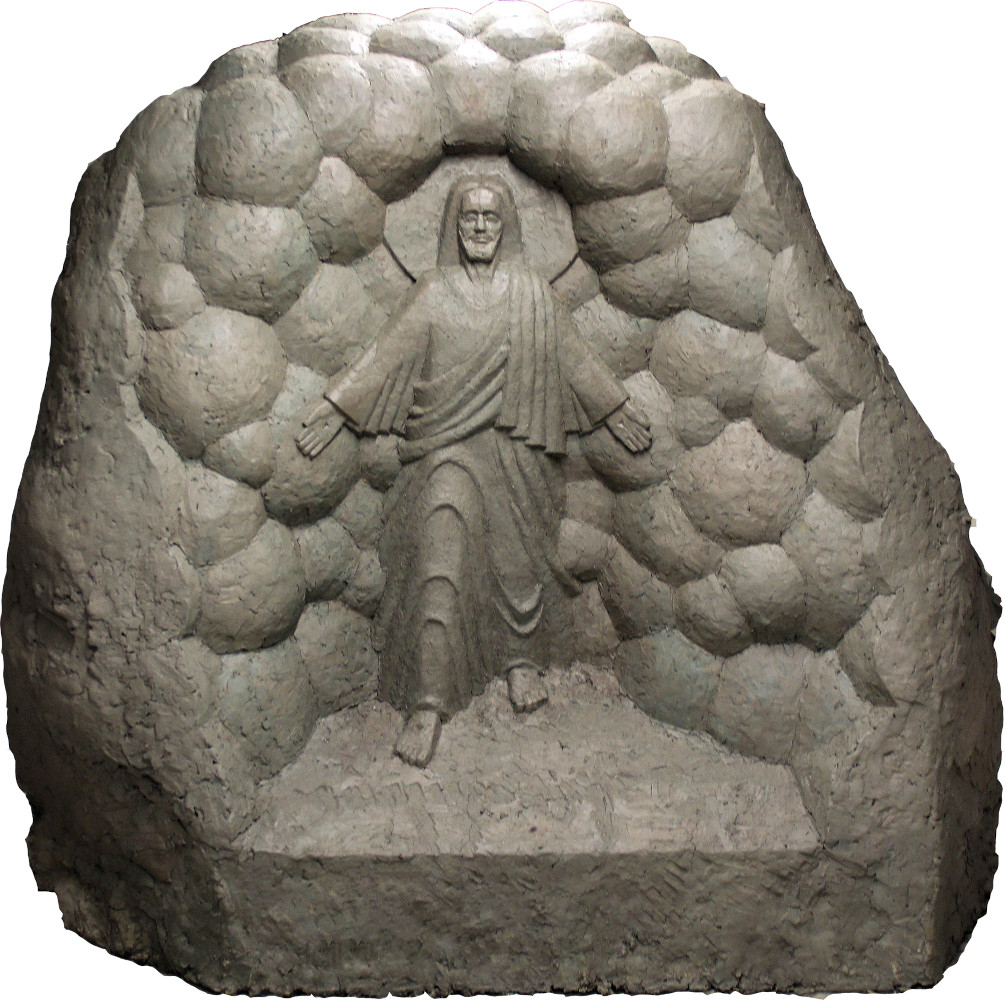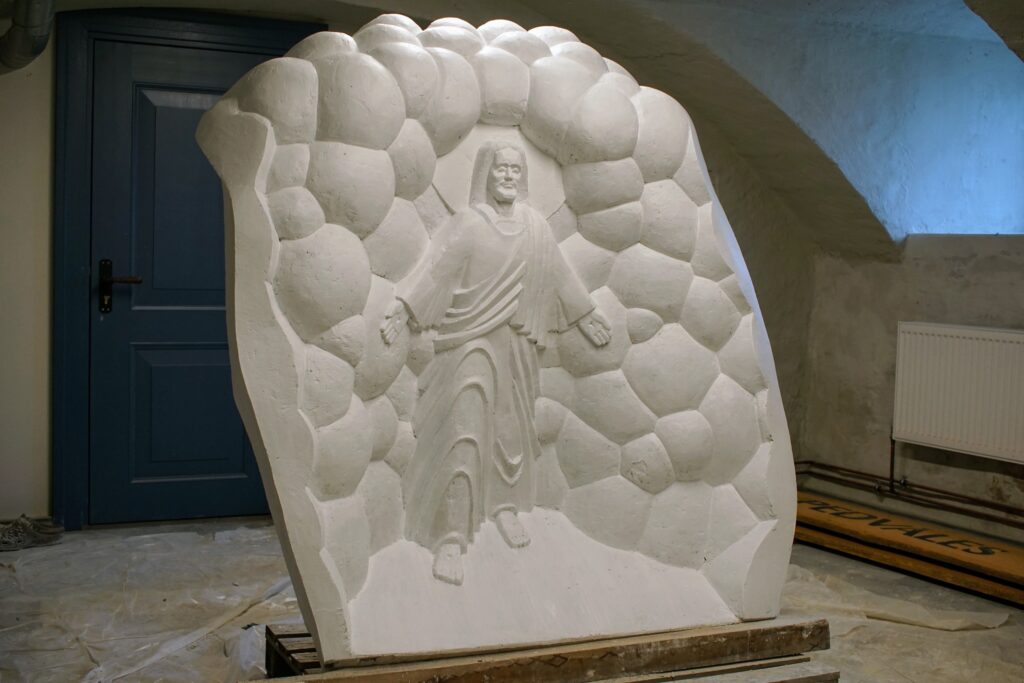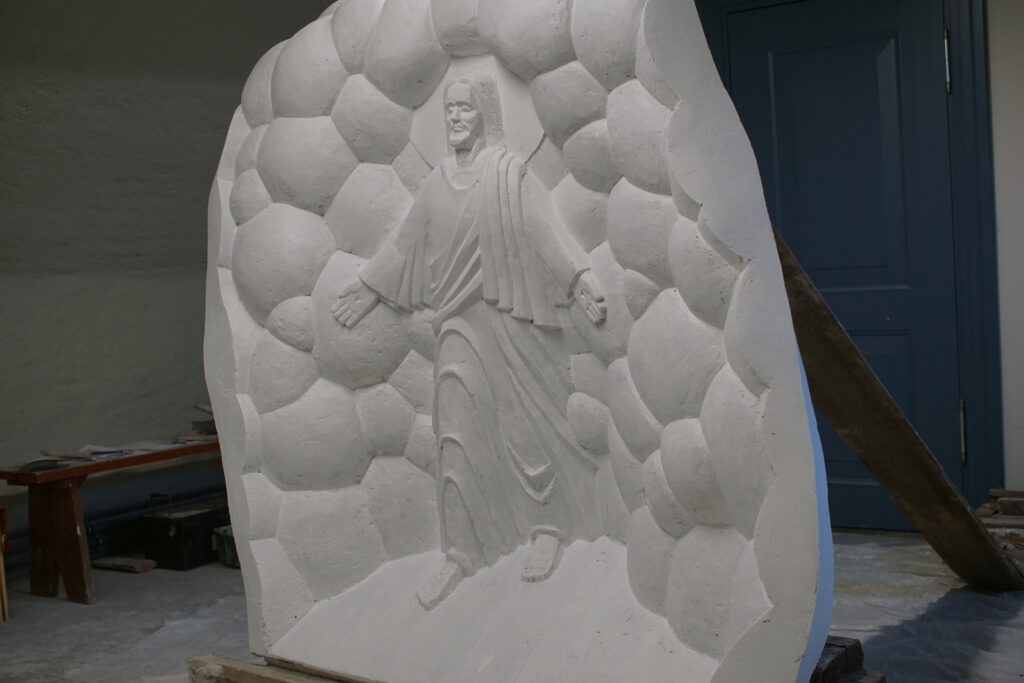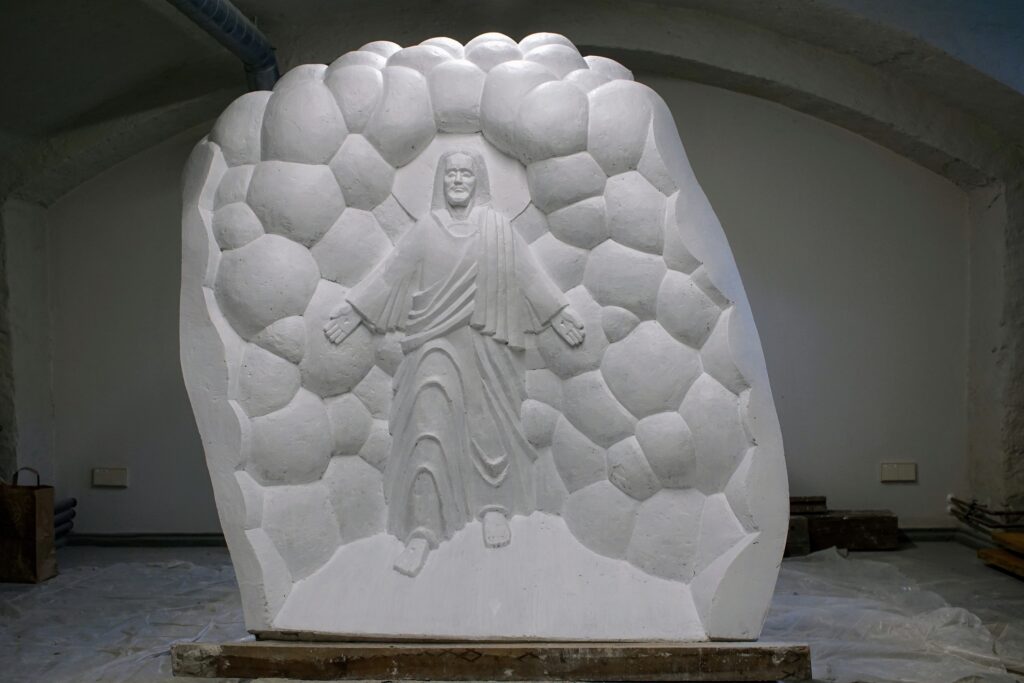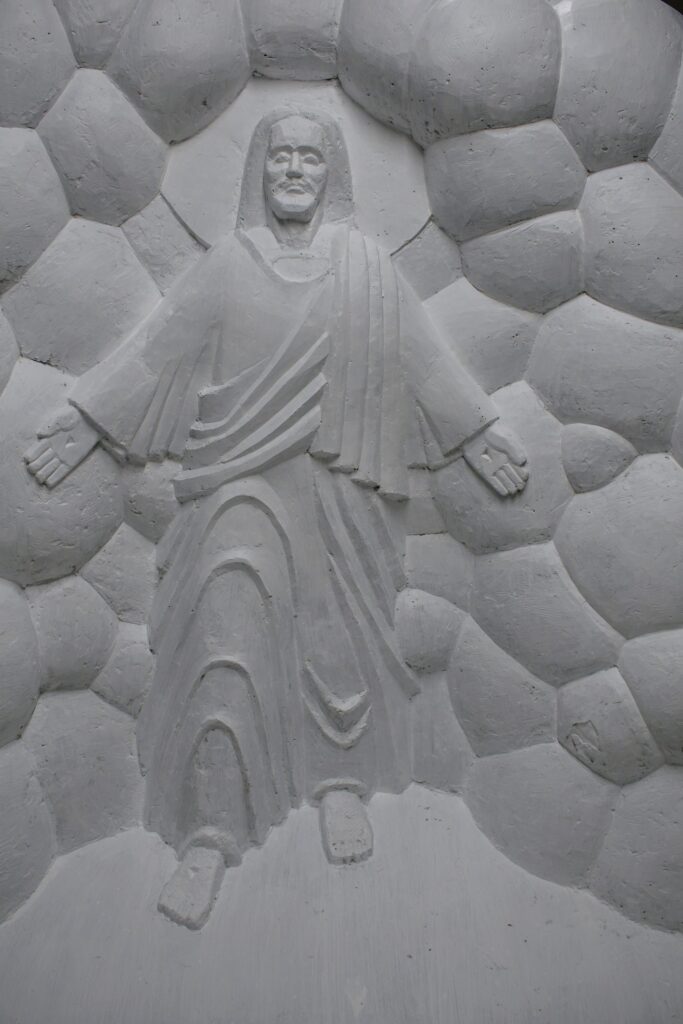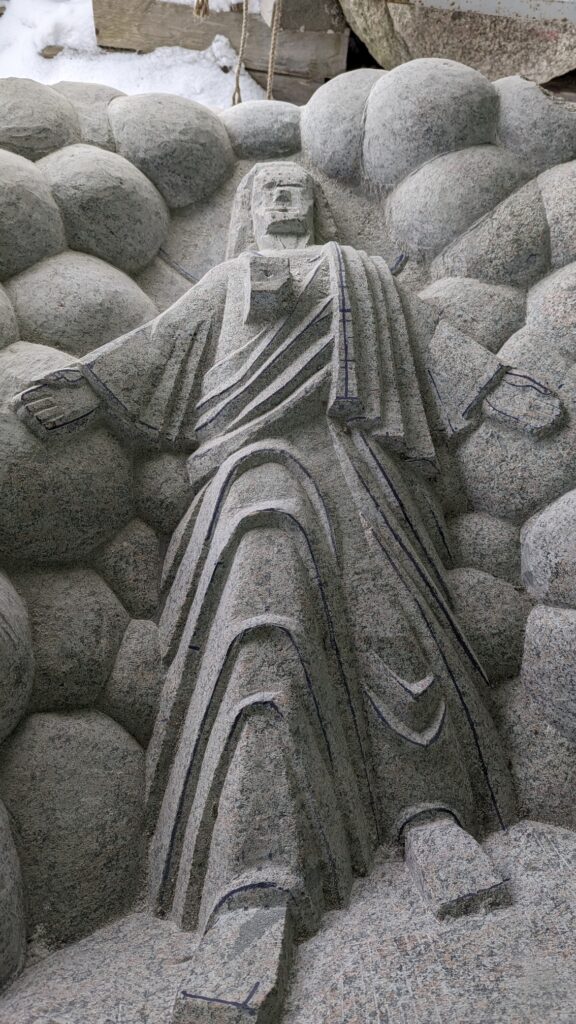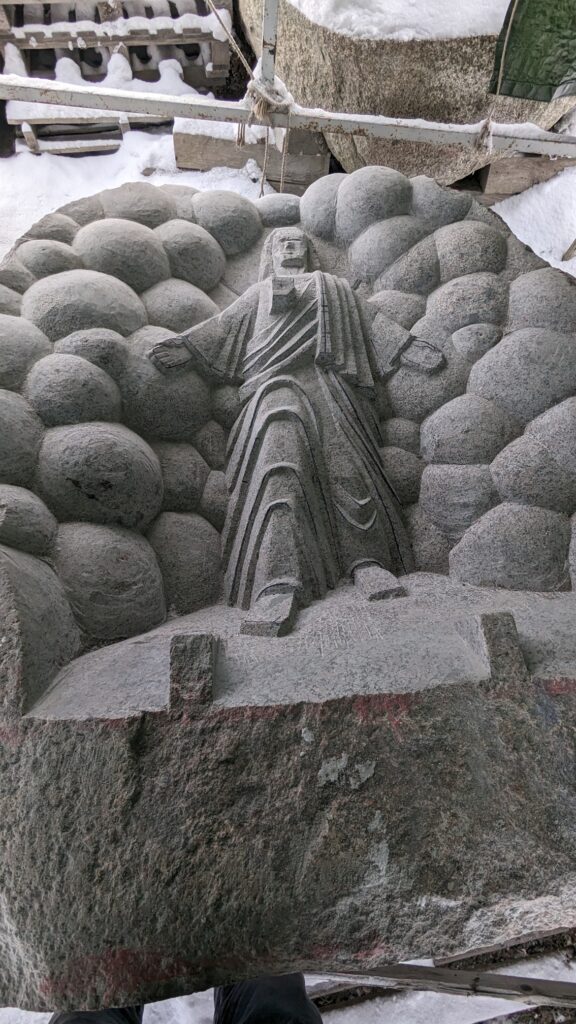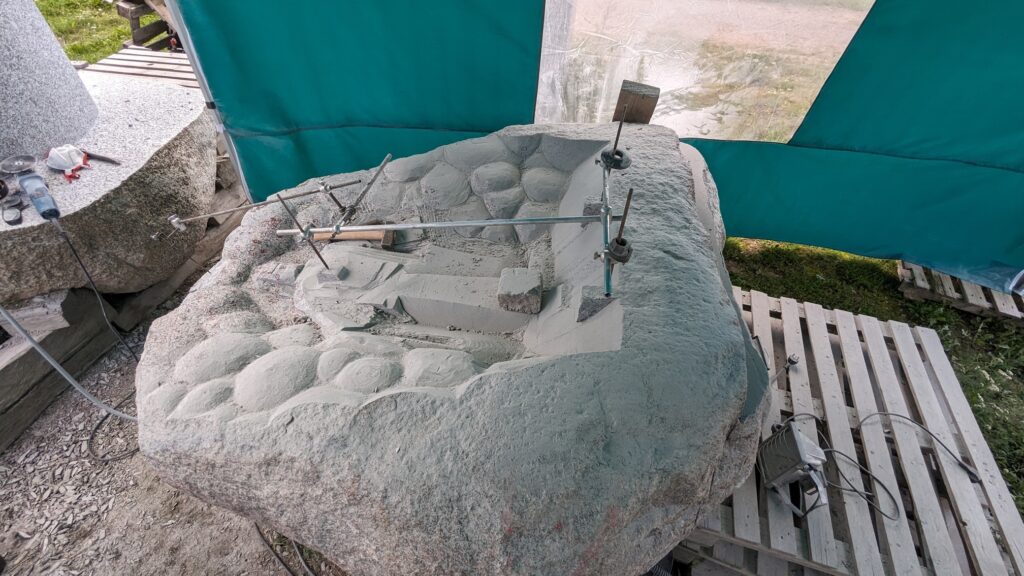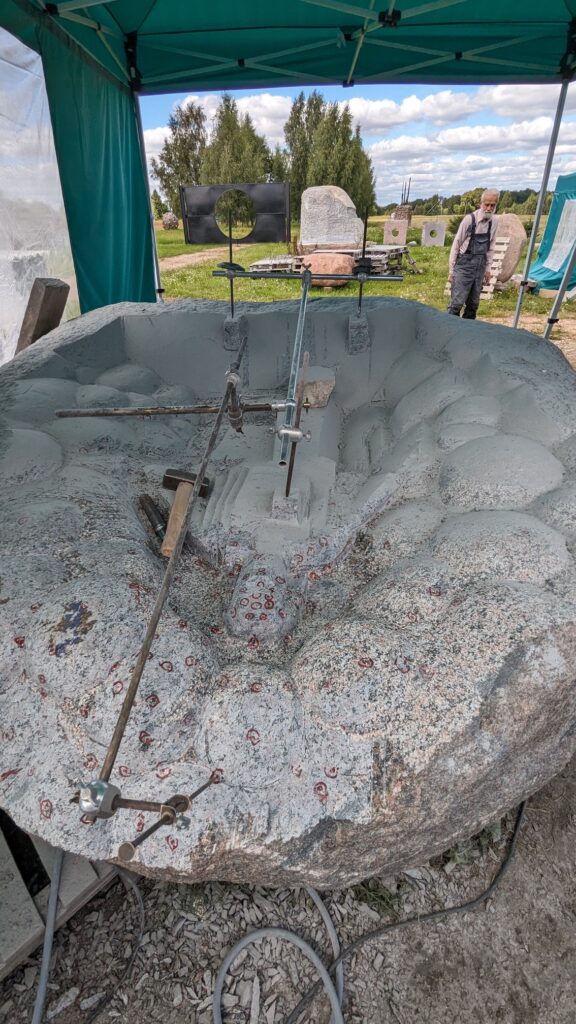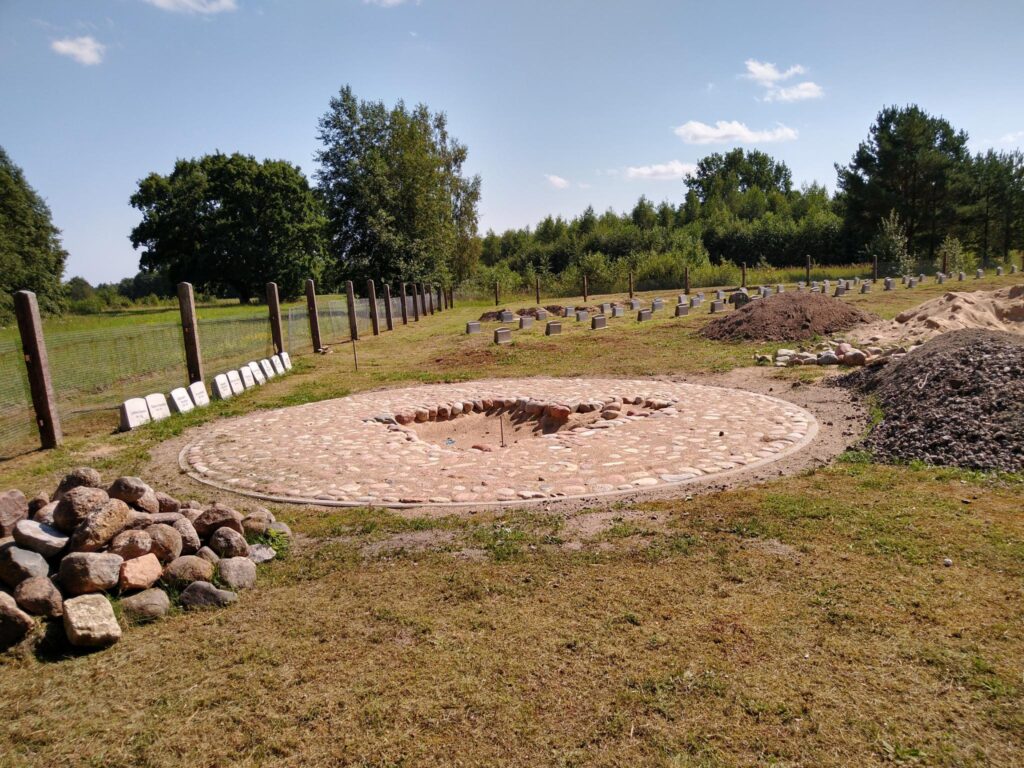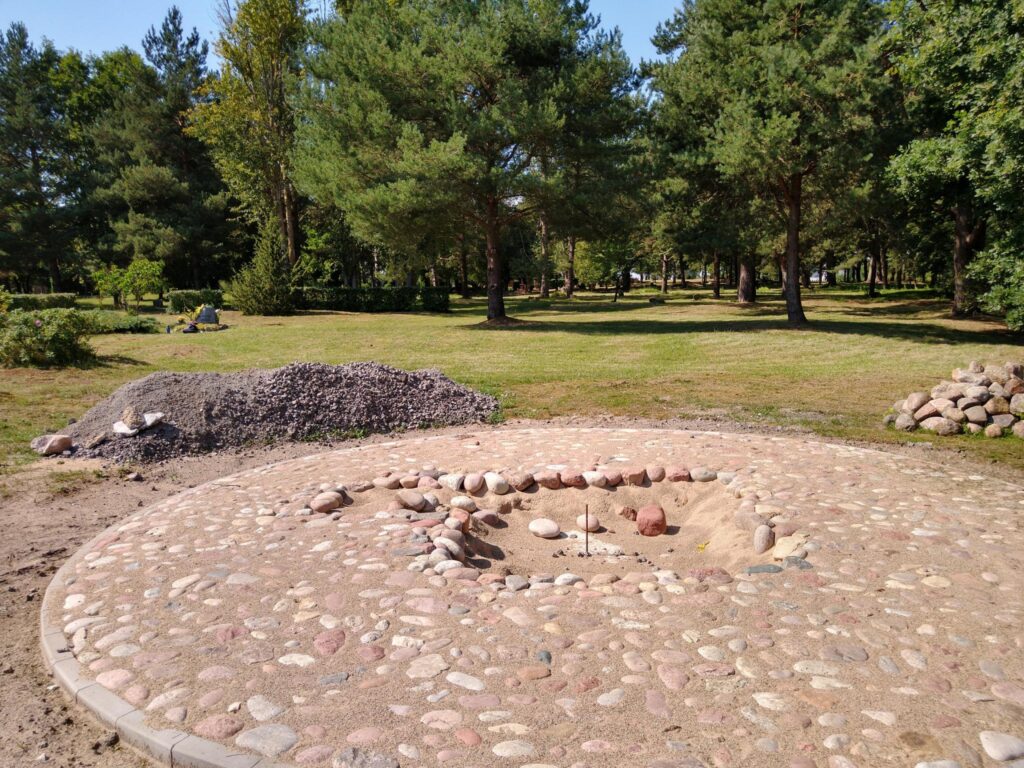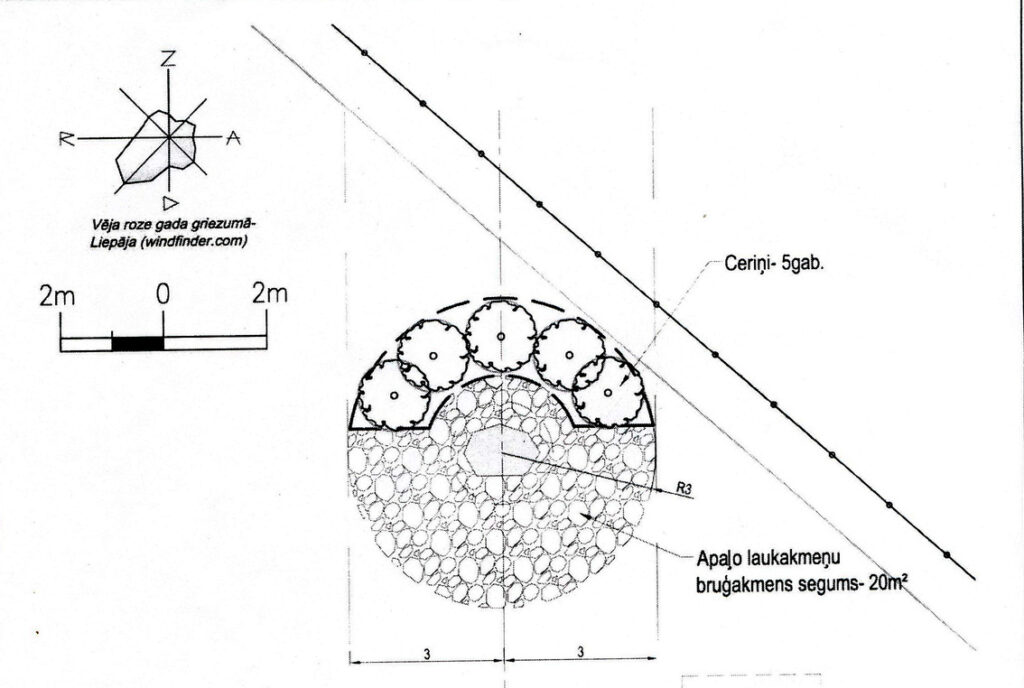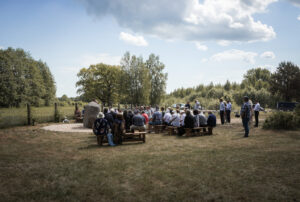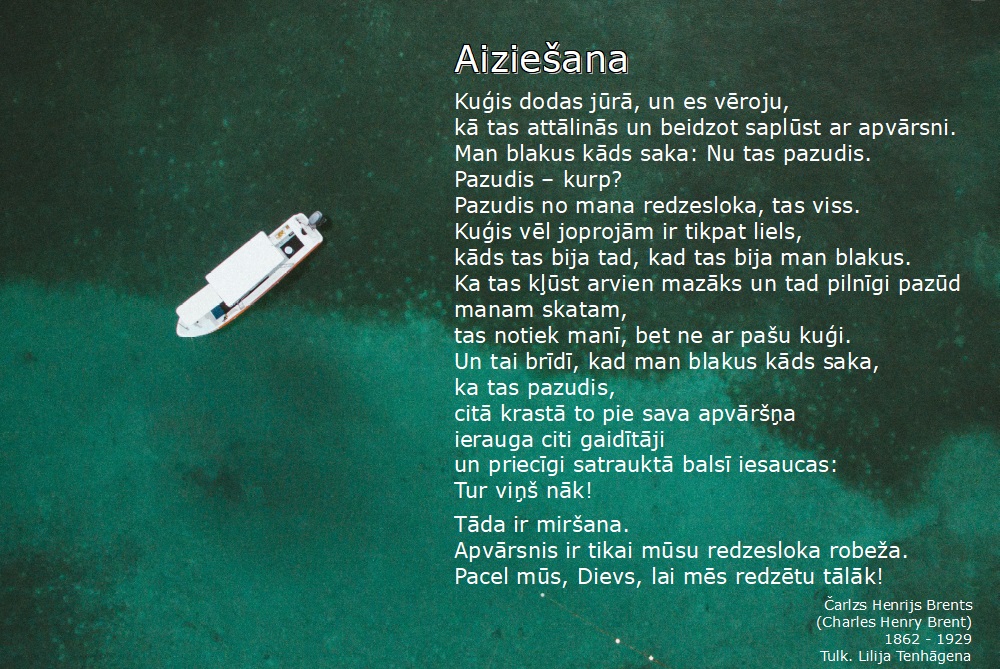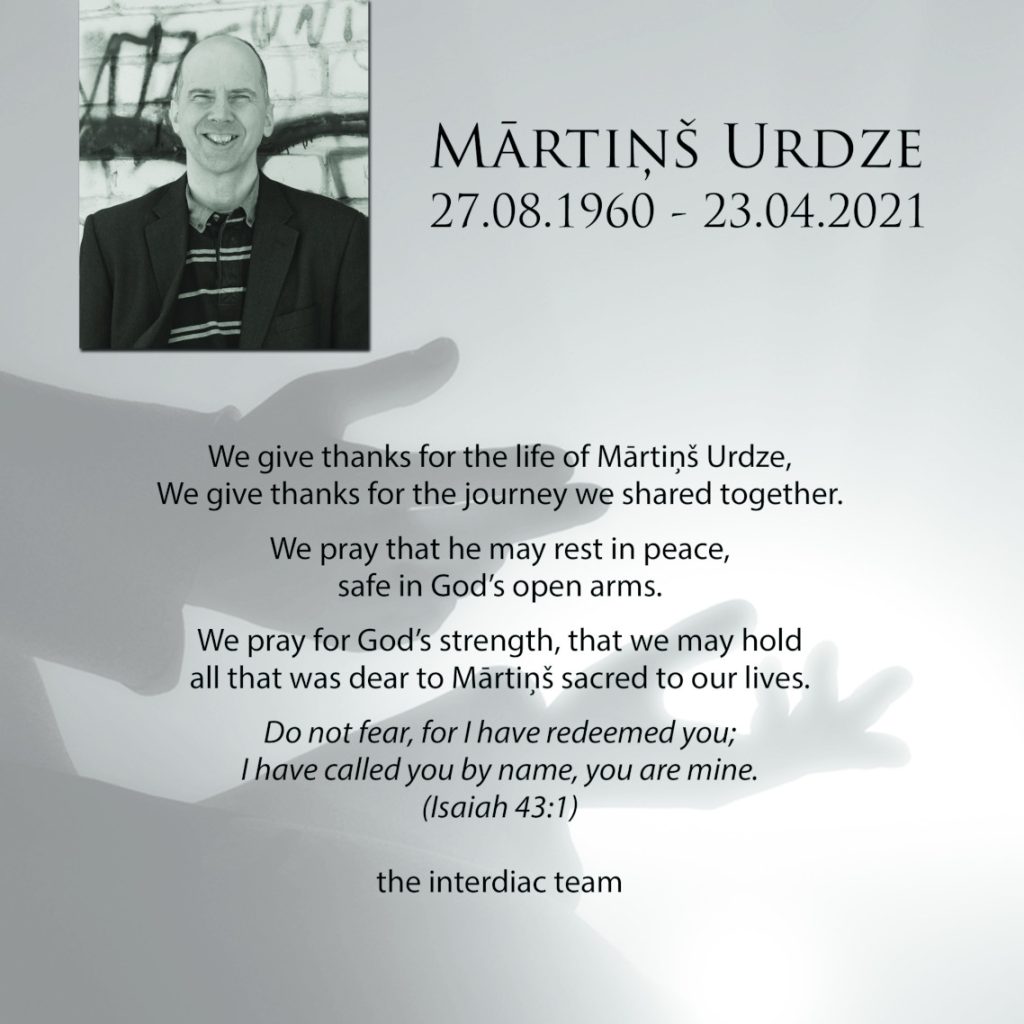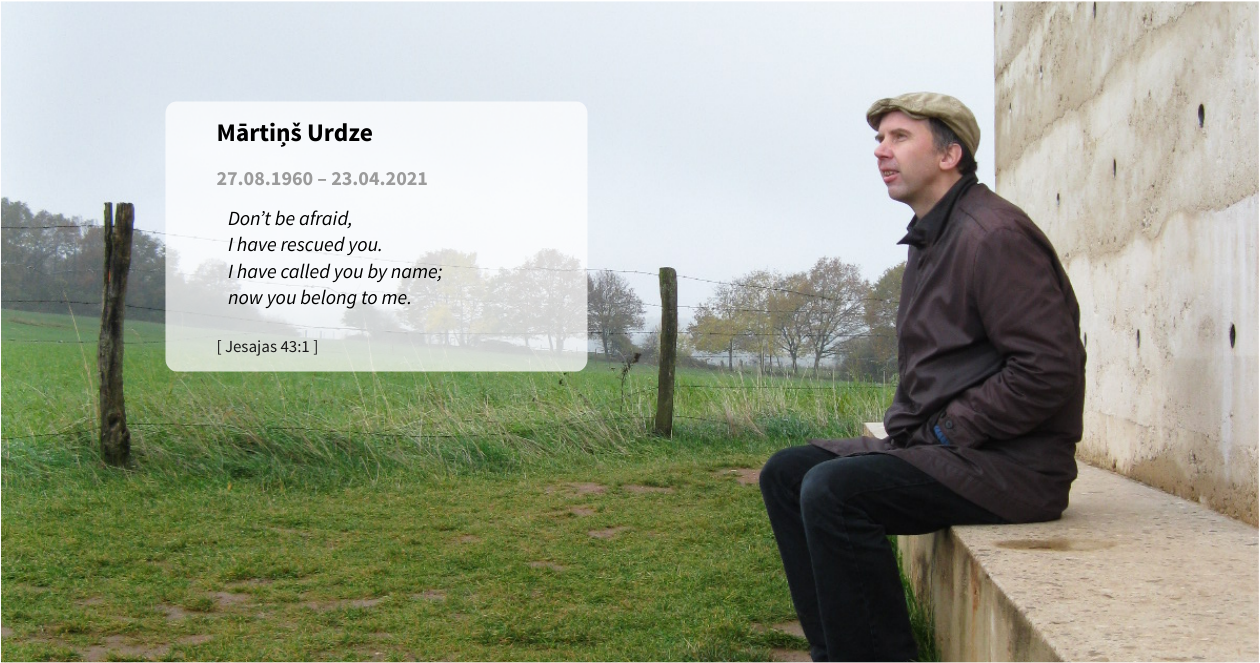
This website is for everyone near and far who was and is together with Mārtiņš in spirit.
Death has not stopped the work he did nor the values he lived and advocated.
Jesus Stone in the Limbiķi Cemetery
Mārtiņš Urdze, pastor of the Liepāja Cross Evangelical Lutheran congregation, passed away in 2021. His grave is located at the far end of Limbiķi Cemetery, where the deceased from the nearby social care centre “Iļģi”, whose residents Mārtiņš cared for for many years, are buried. His last wish was to erect a monument that depicts Jesus with open arms, and the Bible verse:
“Come to me, all you who are weary and burdened, and I will give you rest.” (Matthew 11:28)
Thanks to the support and donations of many people, in 2024 Mārtiņš’ wish came true and the Jesus stone created by Ojārs Feldbergs was installed in the cemetery.
We invite you to pause here for a moment of silence and contemplation.
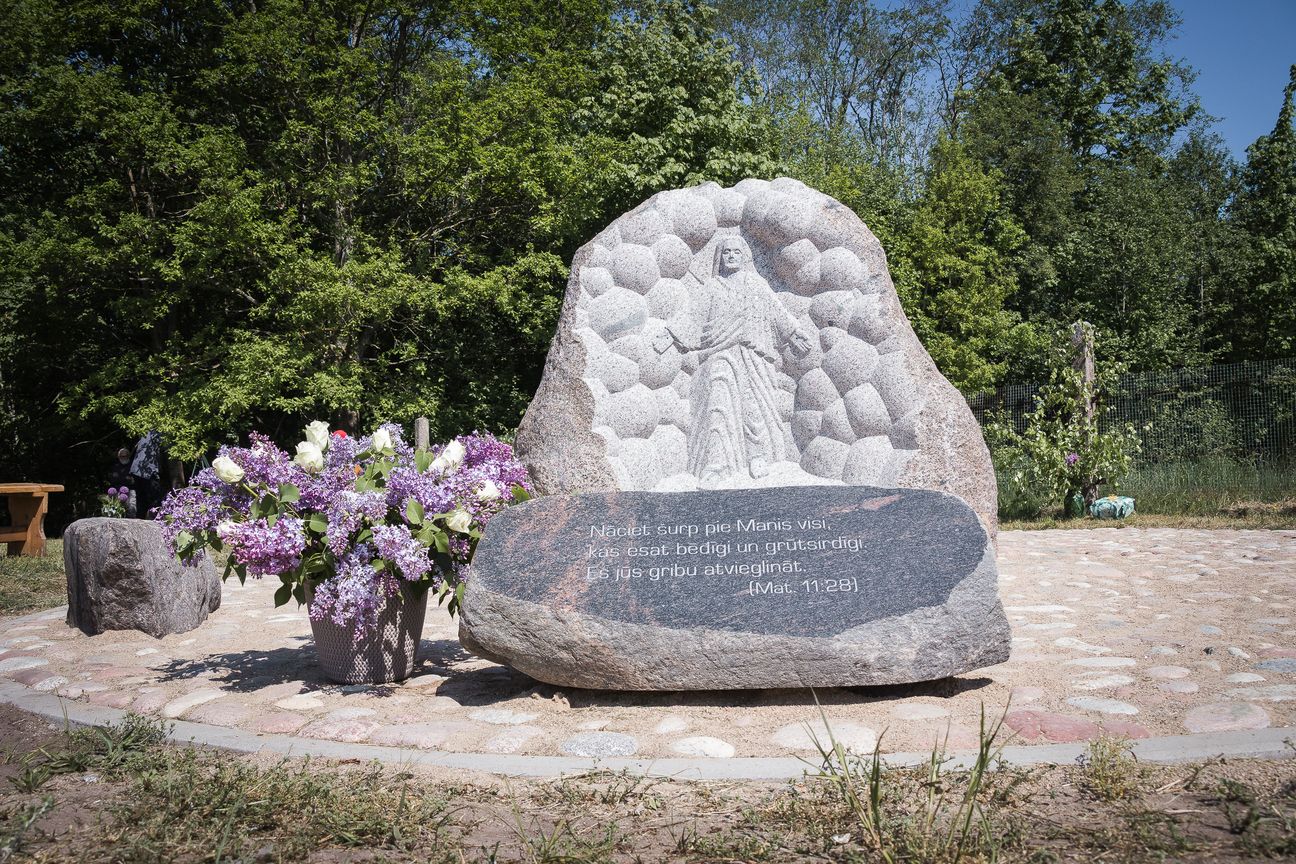
Inauguration Celebration on May 19, 2024
Photo: Dāvids Birulis
Speaches
Toms Urdze
Translated with the help of Deepl.com
Dear guests,
We are here in a cemetery that most of us did not know previously. I would like to take a look at how we and this statue got here.
It is spring 2021, the coronavirus pandemic has everything in its grip, it is cold and Mārtiņš has cancer. His strength is visibly declining. A week before his death, he takes me and Tabita to Limbiķi cemetery and tells us that he wants to be buried there, in the part where the residents of the Iļģi social care centre are buried. This decision is unexpected, but not really surprising, because it is a decision that characterises Mārtiņš and shows his attachment to these people. Respect for every person was important to him; the weak, the fragile, the marginalised were particularly close to his heart. Caring for them and giving them a place - that was Mārtiņš's Christian conviction, and this is how he fulfilled his pastoral role in the diaconal community.
He also asks us to ensure that a statue of Jesus is erected in this part of the cemetery, inscribed with the words from the Gospel of Matthew:
Come to me, all you who labour and are heavy laden. I will give you rest.
We can no longer talk about what this statue should look like. He leaves the responsibility for this to us.
Our mother Gita, Tabita and I have a lot of experience with graves and cemeteries, but we knew nothing about the process of creating a statue. Not to mention the creation of a statue of Jesus.
We remembered that Mārtiņš's wife Aija had worked with the sculptor Ojārs Feldbergs on a number of projects. And the sculpture park Pedvāle, which Ojārs created, has always been close to our hearts.
So after Mārtiņš's funeral, we went to Pedvāle to ask Ojārs for advice on how we could realise Mārtiņš's last wish. A week later, we unexpectedly received the news from Ojārs that he was ready to take on the task himself! We could only tell him what we didn't want: for example, a statue of Jesus in the style of Rio de Janeiro. But how to create a Jesus who is approachable, easy to understand in his message and accessible to everyone? We passsed this responsibility on to Ojārs.
Ojārs met our naivety with calm and understanding - both in terms of the possible time frame and the costs. Over the past three years, we have accompanied Ojārs' work: Understanding the idea and location of the monument, the initial designs, the search for a suitable stone, the transport of the stone to Pedvāle, the search for the right representation of Jesus, the time-consuming creation of a model of the statue in clay, the casting of the model in plaster, the hard work of chiselling out the shape of the statue in rain, sun and frost, the meticulous elaboration of the statue, the coordination with the municipality, the preparatory work in the cemetery and finally the transport and installation of the statue.
The fundraising turned out to be easier than expected because so many were willing to support the cause. People who were touched by Mārtiņš's believes and his work, his friends and acquaintances who were moved by the idea of a statue of Jesus in the Limbiki cemetery, but also people who didn't know Mārtiņš at all but simply felt touched by this idea. Together we made his wish come true. Our heartfelt thanks to everyone who contributed!
During the creation of the statue, we realised that this project would be bigger than we had originally imagined. It is not a memorial to Mārtiņš, it is not a memorial to the people who are buried here, but it is a place for everyone, and especially for those whose hearts are heavy with sorrow and sadness. We hope it will become a place where people will pause for a moment to contemplate, find peace, and be encouraged.
Thank you!
Jürgen Phillips
Translated with Deepl.com
Dear Ojārs Feldbergs!
Dear friends from Iļģi!
Dear friends from the Church of the Cross congregation!
Dear Urdze family!
Dear friends of Martin!
Jesus says:
Come to me, all you who labour and are heavy laden,
I will give you rest.
What a promise Jesus makes in the name of God!
Jesus takes up the promises of God in the Old Testament, where his people, where people bring their complaints before God, cry out their distress and God hears them, Yes, God hears you, helps and saves you.
In verse 4 of the 23rd Psalm, the psalmist confesses his trust:
and though I walk through a dark valley ,
I will fear no evil, for you, God, are with me
and comforteth me .
Or in the 139th Psalm verse 9 it is written:
And if I take the wings of the dawn
and abide at the uttermost parts of the sea,
even there, O God, your hand would hold me
and your right hand will guide me.
Even Job, who is experiencing hell on earth, is seriously ill, lost his family, is surrounded by false friends and his financial existence destroyed, even Job, after a long long struggle full of despair, even doubts about God and and life:
God my Saviour lives, he hears the cries of the poor and the cries of the poor and wretched.
God's name in Hebrew is: Yahweh, translated: I am, I will be there for you.
And this God hates social injustice and calls on people to to show Him respect.
And this God hates social injustice and calls on people to to show Him respect. To give away His gifts in love.
In the book of the prophet Isaiah chapter 58, verses 7.9-11 the prophet speaks the following words in the name of God:
When you break bread with the hungry and let your heart find
and bring into your house the destitute without shelter, when you clothe
when you clothe those who have nothing to wear. If you oppress no one in your midst and point your finger at no one and
and speak evil of them,
then your light will rise in the darkness and God will strengthen you. And you will be like a watered garden and like a spring of water that never lacks water.
Jesus now takes up this message from God in his own time.
Yes, he confirms again and again: God is there for you. He is very close to us.
God gives us the strength to live and to love one another.
Yes, in Jesus this message of love lives from person to person on God's behalf.
Jesus is turned to all people, but especially to those who are weary and burdened,
who are weary and burdened.
He gives us people who entrust themselves to him the courage to live.
He heals us with his words and deeds, our souls and bodies
and promises to refresh us in the future.
Jesus promises us that if we follow his path and are there for people, also accept the poor and the afflicted into our community, then our souls will also find peace.
On this journey with Jesus, we can entrust ourselves to him again and again.
And he helps us when we ourselves become weary.
Come to me, you who labour and are heavy laden,
I will give you rest, says Jesus.
Amen
I am impressed by how the artist Ojārs Feldberg's statue depicts Jesus and his promise.
Jesus is coming towards us. And the further away we stand, the more Jesus moves towards us with open arms.
Jesus takes us with him on his path of love and hope.
Simple and unpretentious, he speaks to ordinary people and yet so expressive and wonderful at the same time, like the artwork by Ojārs Feldbergs.
Thank you from the bottom of my heart for all your thought and effort.
Prayer
Translated with DeepL.com
Prayer (freely adapted from Iona)
Jesus, it is good to know that you lived among us as a human being.
You walked the same paths in life, had the same feelings.
You too were exhausted and tired; your feet ached from the stony paths.
You were hungry and longed for a place of peace and security.
It is also good to know that you enjoyed eating in company and savoured good wine on feast days.
You allowed your feet to be rubbed with precious oil.
The wind stroked your face, you took a child in your arms and lifted it up to heaven.
You allowed yourself to be touched. You did not turn away from people who were considered unclean.
You laid your hands on the sick. And you yourself leant your weary head on the shoulder of a friend.
We thank you that you know our burdens and know what we long for.
You meet us with open arms and say: Come to me!
Lord Jesus, we come and ask you for your closeness and your strength for all those who ...
Hear our prayer.
Lord Jesus, we come and ask you for your closeness and your strength for all those who ...
Hear our prayer.
Lord Jesus, we come and ask for your closeness and your strengthening for all those who ...
Hear our prayer.
Blessing
A poem by the Latvian poet Ilze Kalnāre
begins with the words:
‘The stone speaks, the mountain speaks,
the ears of corn in the field speak.’
Could it be that today we are hearing
how the stone speaks?
But the poet adds,
that one must listen with the heart.
Jesus Christ, thank you for connecting us with you.
Come and stay here,
bring joy, let peace be experienced,
let us feel eternity in the silence.
I ask for God's blessing -
for those who already rest here,
give blessing to those whom you will call home,
and be with all
who will linger here after us -
May the blessing be comfort and strength:
May the Lord bless you and keep you,
May the Lord make his face shine upon you
and have mercy on you,
The Lord lift up his countenance upon you
and give you peace. Amen
Information
Ojārs Feldbergs
Born 10 January 1947 in Riga. Ojārs Feldbergs’ father had recently returned from forced exile in Russia but was deported again in March 1949. Feldbergs lived in the Sarkandaugava district of Riga with his mother and younger brother and studied building construction at a technical school. In 1976, he graduated from the Sculpture Department of the Art Academy of Latvia.
After Latvia regained its independence in 1990, Feldbergs moved to his father’s native parish of Abava and in 1991 purchased the former manor house of Firkspedvāle Estate, next to which he established the Pedvāle Open-Air Art Museum. In 2018, it was renamed Pedvāle Art Park.
In 2009, he received the Order of the Three Stars, IV Class, the highest award of the Latvian state, for his services to the country.
Feldbergs’ work can be found in the Latvian Artists’ Union Museum, the Latvian National Museum of Art, and various museums as well as private collections in Latvia and abroad.
Limbiķi Cemetery
Translated with DeepL.com.
Limbiķi Cemetery is located on the outskirts of Grobiņa.
Behind the cemetery is a large area where the residents of the care centre "Iļģi" are buried. This plot of land is divided into two parts: the older part has large trees and a few years ago, when the land was consecrated, a wooden cross about 3 metres high was erected in the middle. Some graves still have their tombstones. This part connects with the rest of the 'normal' cemetery. In the youngest part, behind a low shrub fence, there is a clearing. Walking there, the graves can be guessed more than distinguished. There are no paths. Only a few graves have headstones. In the far corner there are several rows of recent burials. Unlike the rest of the cemetery, which is surrounded by a wooden fence, this section is surrounded only by a wire fence.
When in 1962 the municipality of Grobiņa granted this land to the care centre 'Iļģi' for the burial of its residents, it also made the centre responsible for the care of the cemetery. The small resources, barely sufficient to care for the living, make the care of the cemetery practically impossible. From time to time, clean-ups are organised.

“Iļģi” Social Care Centre
Translated with DeepL.com
The branch of the State Social Care Centre "Kurzeme" is located in Grobiņa municipality, in the manor house "Iļģi". The castle was designed by the architect Markoni Henrik (1792-1863). Markoni was inspired by the house of the Teutonic Knights' castle in Malbork Fortress in Prussia. The architect respected the German environment of the Latvian estates and the owner's desire to preserve his ethnic ties with his homeland. The owners were D.Br. von Offenbergs.
In the 1920s, the building was used as an agricultural school, which was interrupted by the Second World War. During the war, the castle was used as an infirmary for the German army and suffered from artillery shelling during the "Kurzeme Kotel". After the war, the building was restored by reconstruction; only the balcony railings have survived as a historical architectural monument and are listed as a national protected architectural monument.
Since 1948, the place name ''Iļģi'' has been associated with social care. First, the Liepaja City Home for the Disabled was established here, which was later transformed into the Liepaja County Home for the Elderly. In the 1960s, by order of the Ministry of Social Security of the LSSR, Iļģi became a psychoneurological nursing home, and the construction of a new block was carried out, thus increasing the number of places for clients.
Today, 270 people with severe mental disabilities, aged from 18 to old age, have found a home in the institution, which is officially known as the State Social Care Centre "Kurzeme", branch "Iļģi". People's functional status varies widely. In their daily life, the residents have the opportunity to do handicrafts, visual arts, woodworking, floristry, ceramics, singing, dancing, theatre, gardening. The care centre also organises various cultural events and is visited by pastors of different denominations. Some of our clients have relatives and maintain a relationship with them, but the majority are alone and are cared for only by the warmth of the state and the people around them, including the staff.
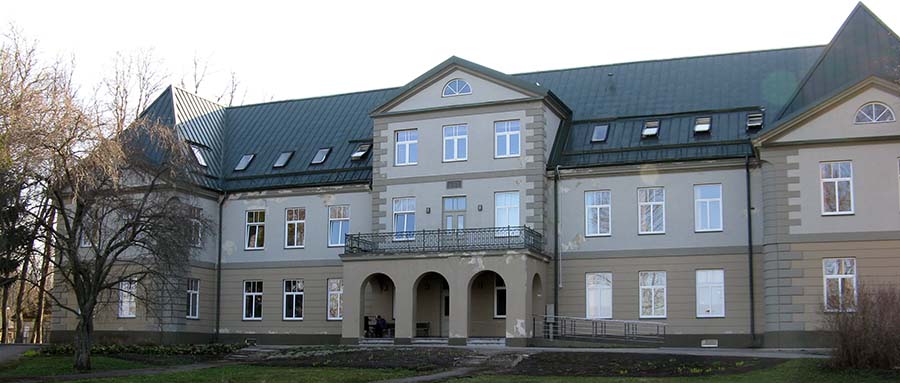
Mārtiņš Urdze
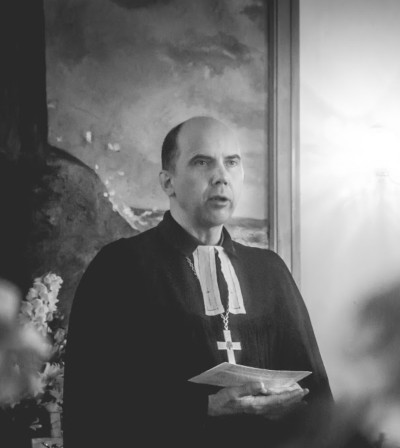
1960
August 27, 1960 – was born in Oldenburg, Germany, as the first child to Gita and Paulis Urdze. He was later joined by siblings Pēteris, Tabita and Toms. Pēteris died in 1982 in England in an automobile accident.
1981
1981 – 1988 – studied theology at universities in Neuendettelsau, Berlin and Hamburg.
1990
1990 – was ordinated as a pastor in the Latvian Ev. Luth. Church Worldwide.
1991
1991 – 1993 – studied to become a certified elder caregiver.
1993
1993 – 1995 – worked as an elder caregiver in a home for the elderly in Oldenburg.
1995
1995 – moved to Latvia and became the pastor for the Liepāja Diaconal Centre.
1999
1999 – became the pastor of the Ev. Luth. Church of the Cross congregation in Liepāja.
1999
1999 – married Aija Druvaskalne.
2002
2002 – began to also serve as the pastor for the Saraiķi Ev. Luth. Congregation.
2006
From 2006 onward – served as chairman of the board for the Liepāja Diaconal Centre.
2010
2010 – Aija Druvaskalne-Urdze dies of cancer.
2016
In 2016, he leaves the Latvian Ev. Lutheran Church in Latvia, protesting its decision not to allow women to be ordained as pastors.
2017
2017 – honoured as “Liepāja Citizen of the Year” for his work in organising and leading social projects for people with special needs.
2020
2020 – celebrated his 60th birthday.
2021
April 23, 2021 – died at his home in Liepāja, Latvia, following a short but severe illness.
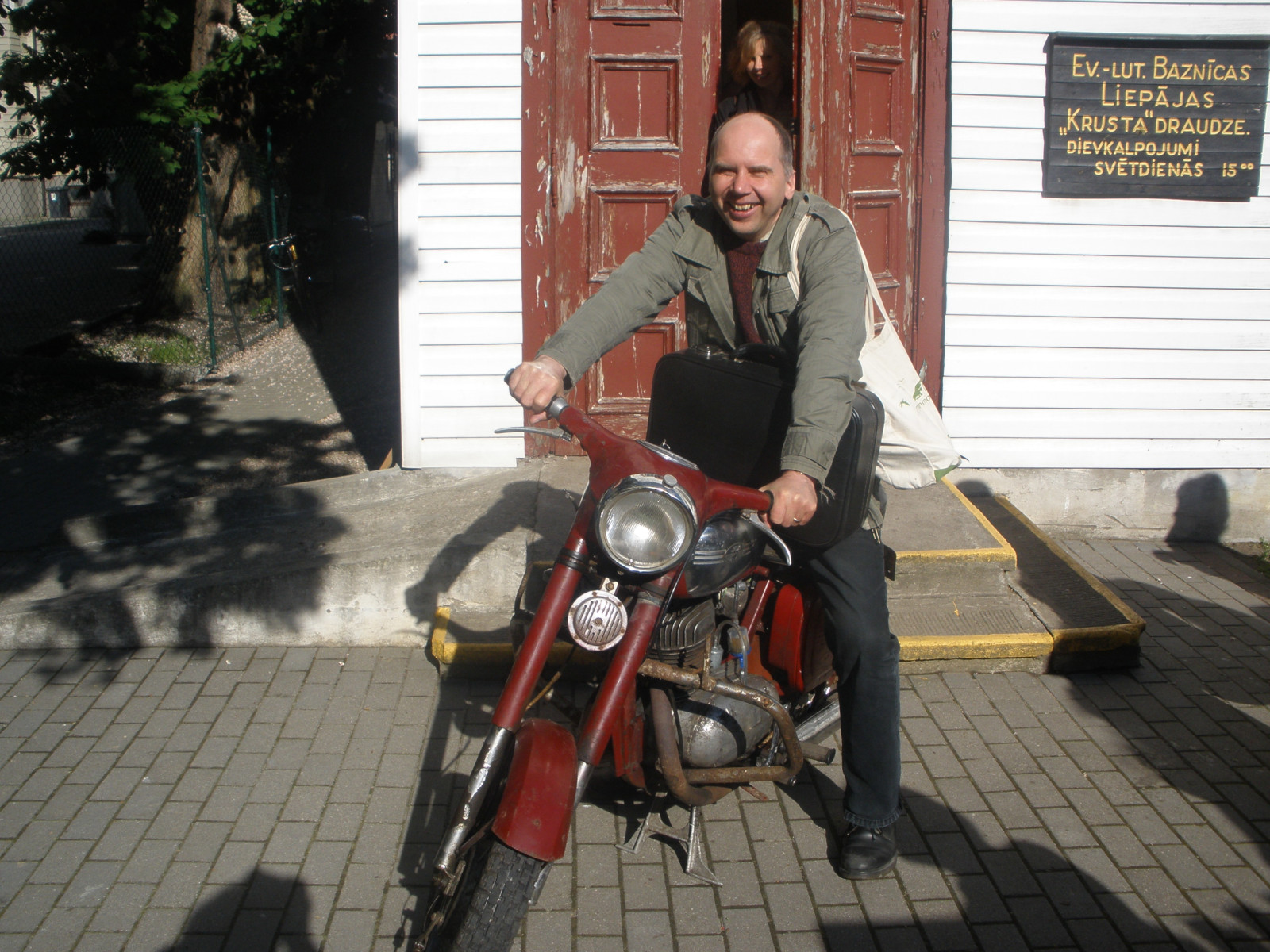
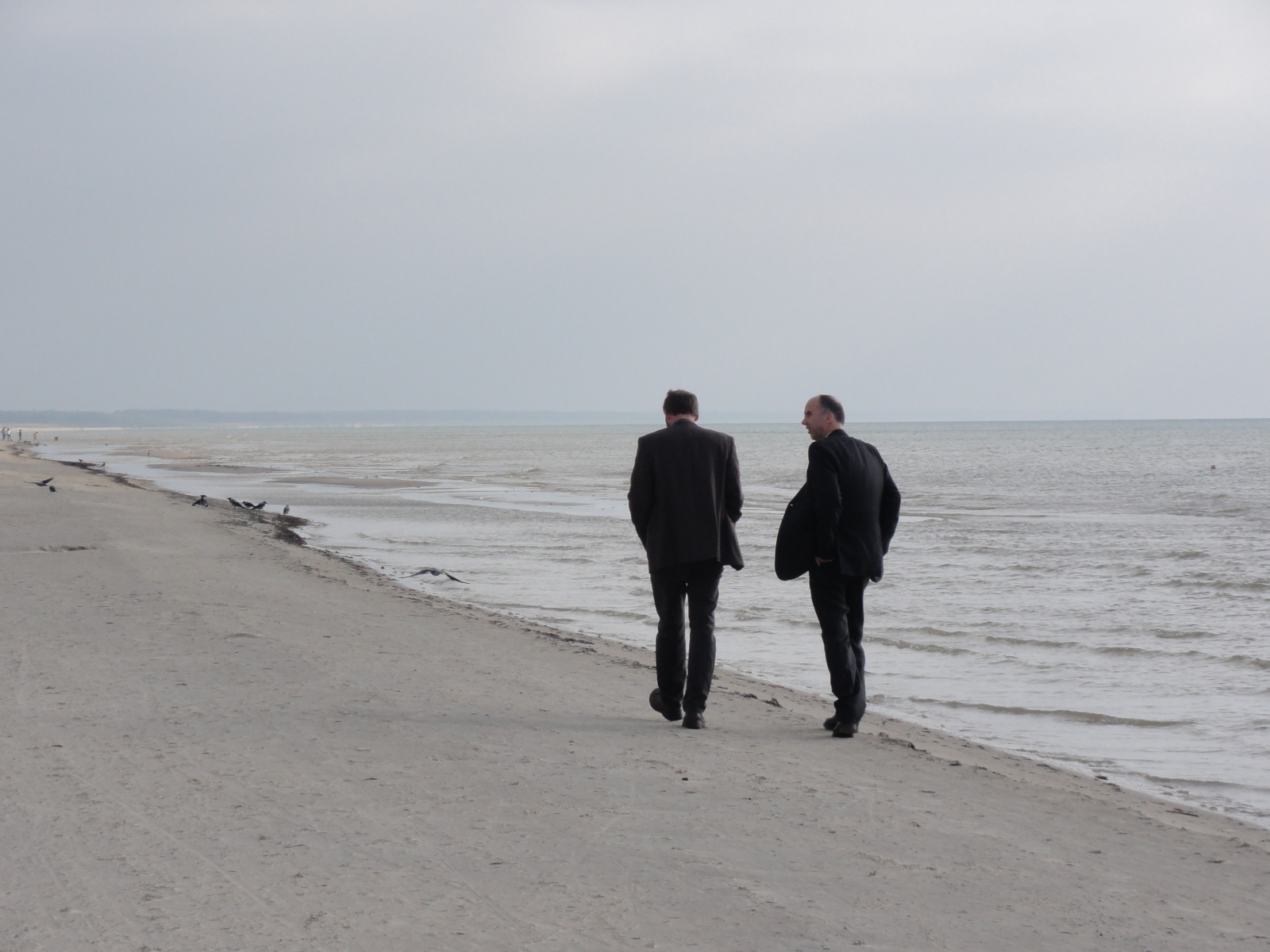
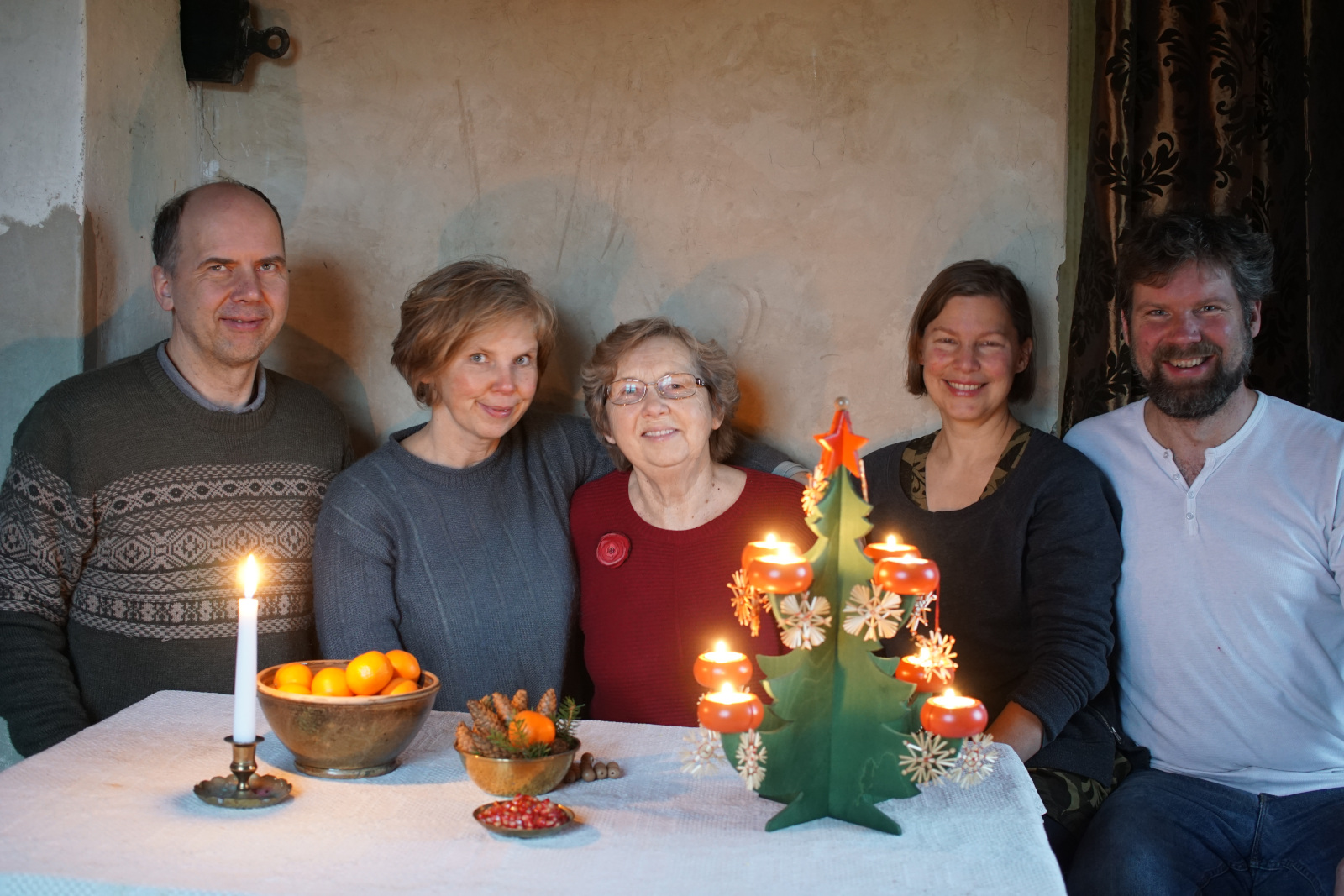
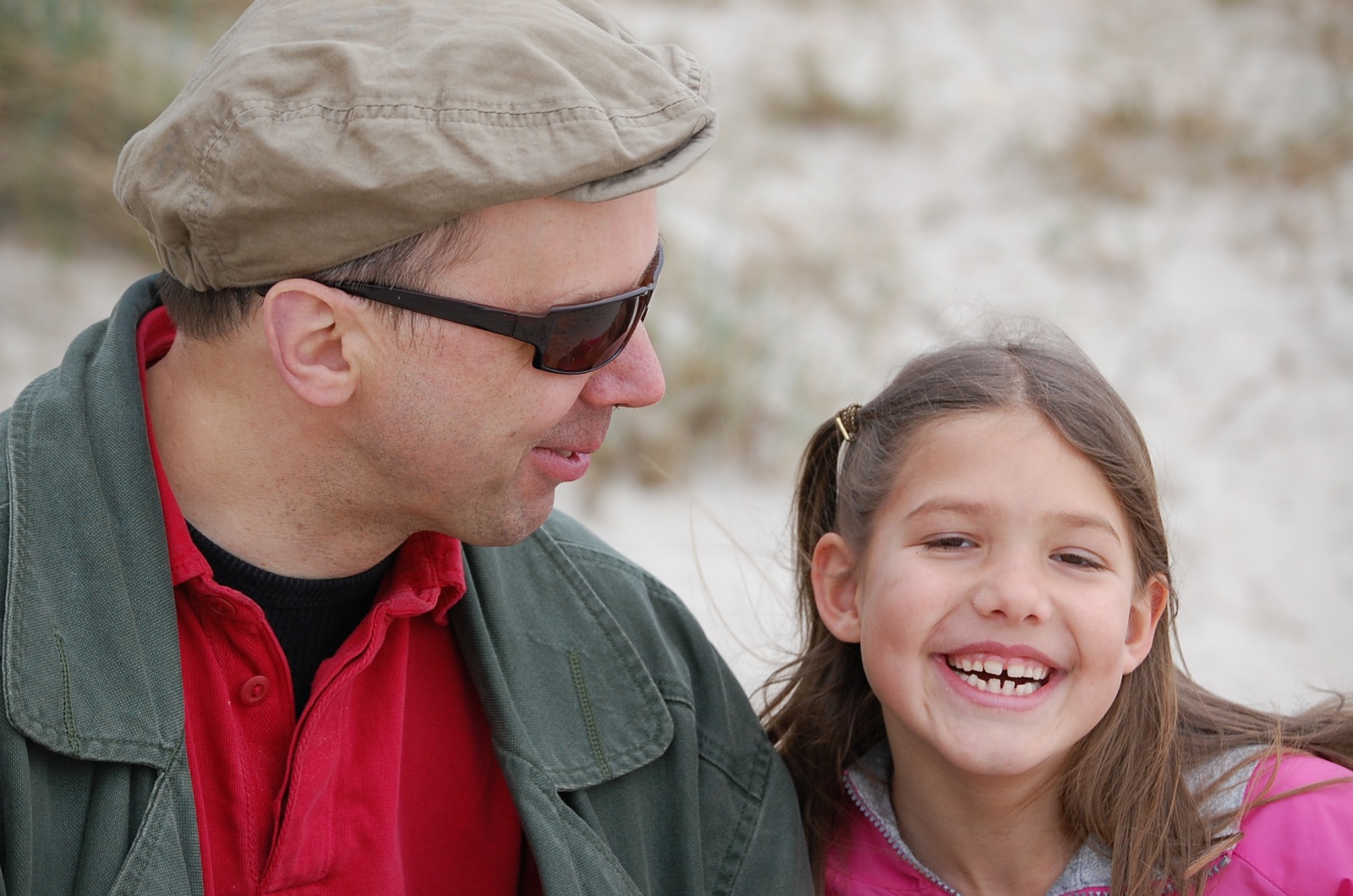
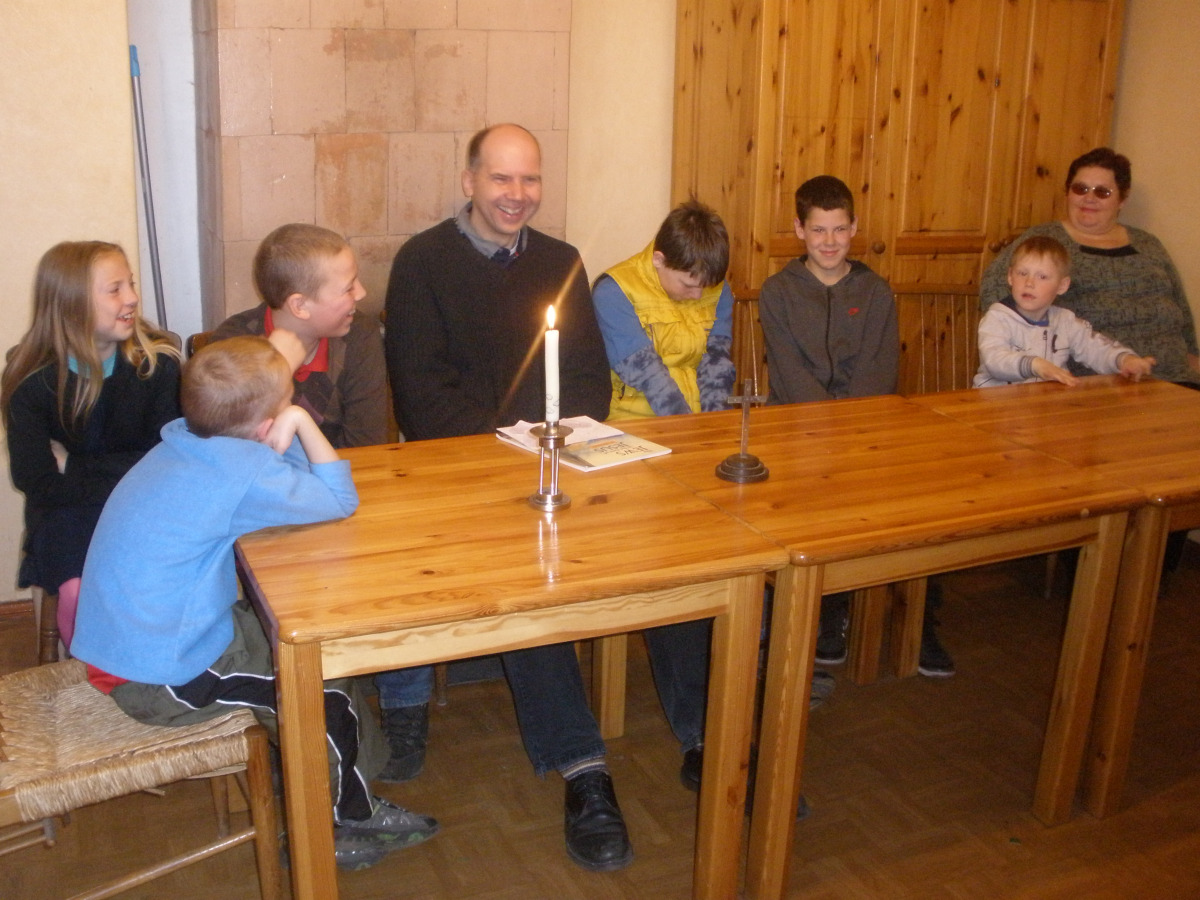
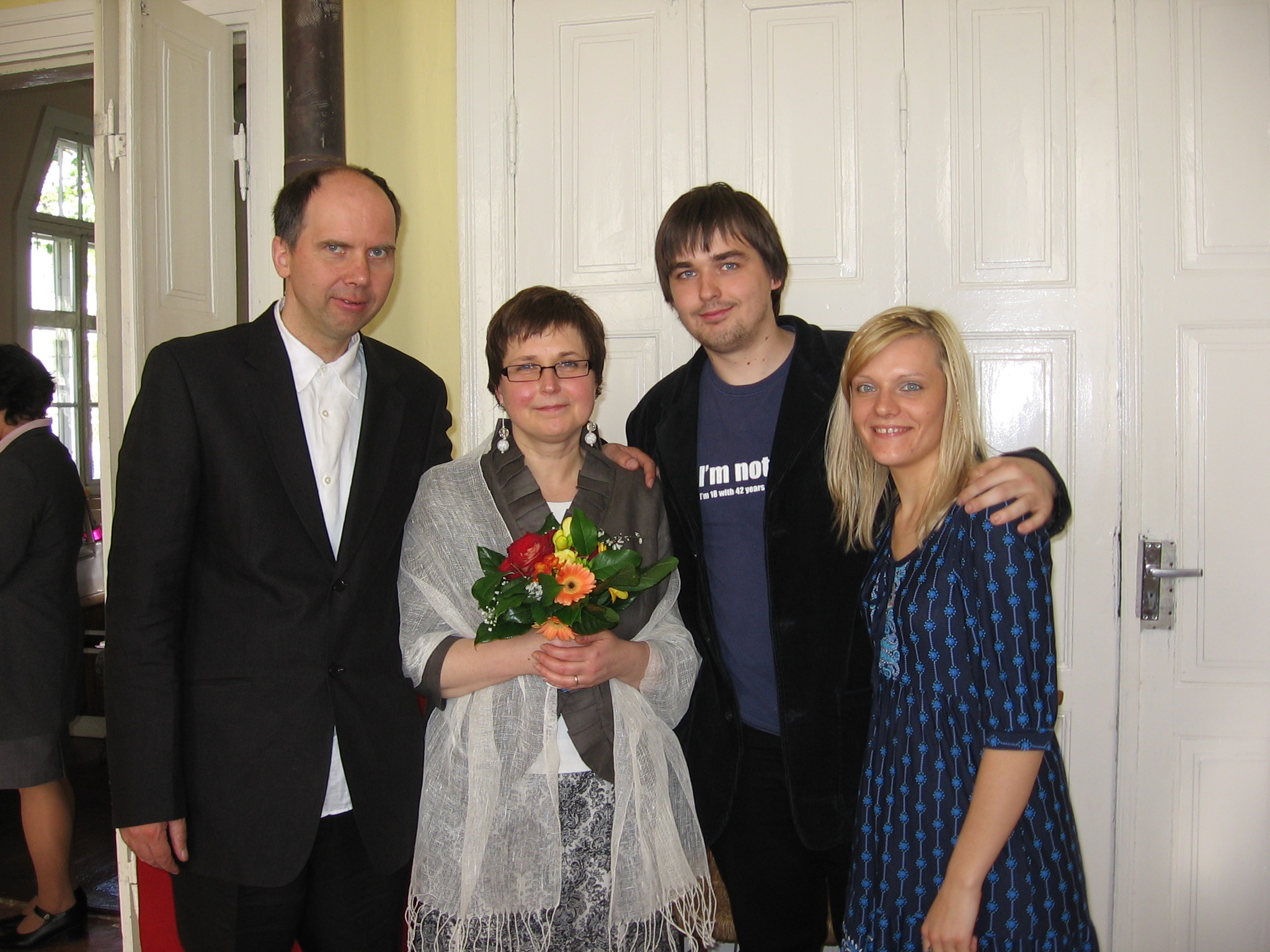
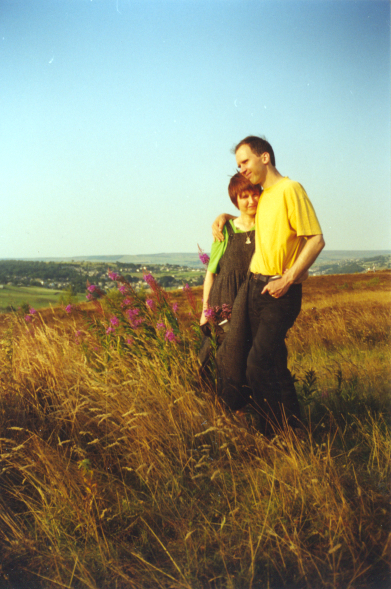
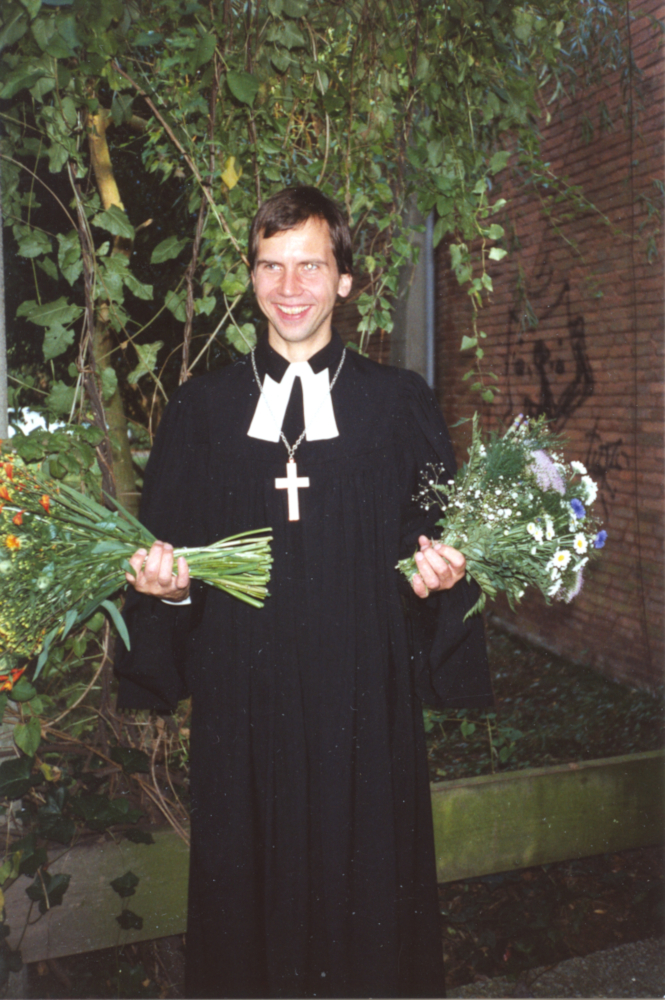
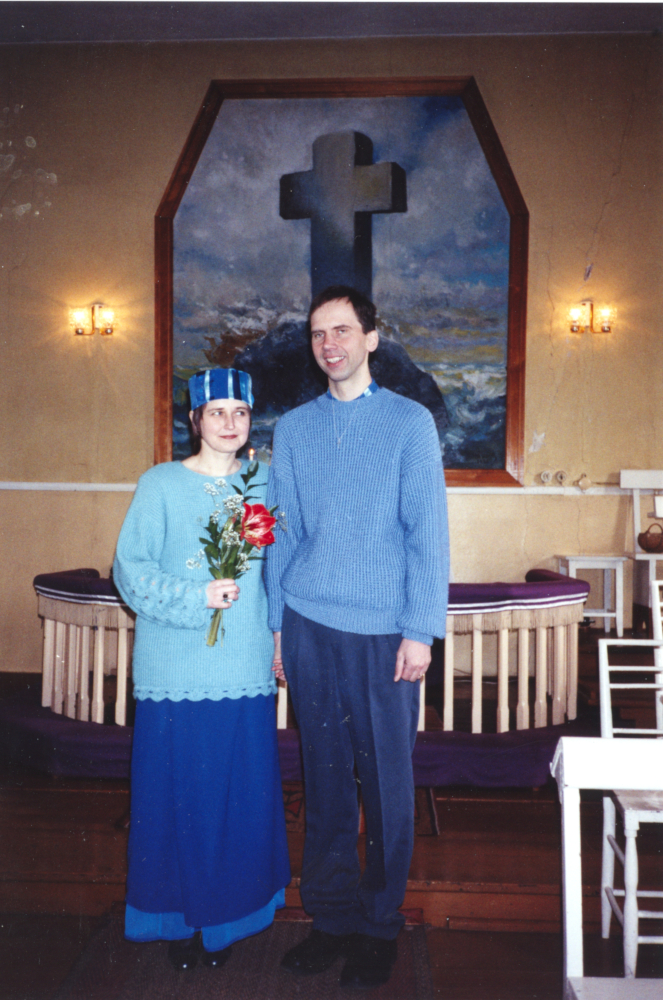
Sermons and Articles
Please visit kalpot.lv, where you will find a vast collection of his work (mostly in Latvian).
Memories of Mārtiņš
Address at Martiņš’ Birthday
Address by Pastor Jürgen Philipps at the commemoration of Martins Urdze on 27 August 2021.
Dear congregation!
And now says the Lord who created you:
Fear not, for I have redeemed you;
I have saved thee, because I have saved thee; for I have called thee by thy name;
I call thee by my name.
(Isaiah 43,1).
Fear not, God said, God says to Martin, God says to us. You are protected in my love, in life, in death and in dying, now and forever.
For I have redeemed you, says God, my love for you knows no bounds.
I call you by your name, Martin. I know your strength and also your weakness, and also all the weight that you carry with the people whom God has entrusted to you.
God says: I am coming to you. I am with you, you belong to me, you are dear to me. You are dear to me.
Dear parish.
In his last letter to me, Martin wrote a letter of deep peace and trust. He has compassion on me: I am doing well, I am protected by God. I am surrounded by the love of those around me.
God looks at us with a loving gaze. God is with us. Martin lived his whole life with this conviction.
It gave him courage! It gave him the strength to give so much love.
Martin lived with the Church of the Cross and the Liepaja diakonia, following in the footsteps of Jesus Christ, the Son of God.
Jesus Christ said:
What you have done to some of my least sisters and brothers, you have done to me. (Mat 25,40)
Martin was with his wife Aija, his family, his friends and his girlfriends; Martin was with his church, people in need, the poor and the sick.
He persevered with great love and humility for his people. He inspired us to do the same.
Boldly and fearlessly he stood up for justice and mercy, because God loves justice and mercy.
Martin spared neither himself nor his own strength.
His life's goal was to build a diaconal church in the succession of Jesus Christ.
A Christian church where the homeless can eat, where the sick can receive help, even free of charge, where the poor can receive clothes, where all can gather, live and work together, and where no one is excluded.
A Christian church where people reflect on and share their lives in Bible conversations, where they pray together in retreat and worship, and where God's good news is proclaimed.
For God is the source of life, and in his light we see light. (Ps 36,10)
God's light shines in the darkness and makes the darkness light.
Martin lived to bring this light of God to people, to pass on the message of God's love and to live it.
For God is love; and he who abides in love abides in God, and God in him. (1 John 4:16)
Martin is and remains a great example to us, a dear man, a friend, a brother in Christ; and he lives on in our memories and in our hearts.
God bless and keep Martin.
Amen
Agnus Dei | Mass in B minor
Nicholas Tamagna, New York. Recorded in Oldenburg, April 2021.
Dedicated to Martin'š while in the later stages of his illness.
Anda Grambardt
This text is an automatic translation from DeepL Translate.
The news of Martin's death is very sad and I would like to offer you my heartfelt condolences.
I associate Martin in my memories first with playing tennis (because during an early visit to you in Ohmstede the TV was on with the tennis broadcast and everyone was intensively watching), of course with playing darts and drinking beer, the cultural centre here in Oldenburg and also with our attempts in Liepaja and as a kind-hearted, funny, good and never shying away from challenges person who alleviated so much hardship!
Dear ones, I am thinking of you and wish you lots of strength and all the best from my heart,
Anda
Andrejs Urdze
This text is an automatic translation from DeepL Translate.
When I think of Martins, I see his smile - open, sincere, sweet, kind, a little cautious and yet at the same time brave.
He also combined two sides of himself in another sense - the spiritual and the practical. Just like your Paul in his time.
He did a great job, despite all the bumps in the road!
May the work he started not be exhausted and may Martin himself live on - even in our memories!
Andrejs
Anna Stepčenko
This text is an automatic translation from DeepL Translate.
Mārtiņš Urdze
In memoria
I met Martins in 2015, when we were in working group meetings with potential partners preparing the application for the European Union Baltic Sea Region Joint Project "Social Empowerment in the Regions" (SEMPRE). The project application was considered a good one and implementation started in early 2016. Latvia was represented by the University of Latvia, Liepaja Diakonija centrs and Vidzeme University of Applied Sciences.
The fact that Mārtiņš had moved to Latvia from Germany came to our attention quite by accident due to the fact that he does not understand Russian, which was used to exchange a few witty sentences between Lithuanian and Latvian partners when we met in Rendsburg after a working day for a relaxed, friendly chat.
Business meetings allow us to get to know people in their various forms and qualities - intellect, working ability and character.
Martins stood out because he radiated a kindness, a warmth of feeling, a serenity that, from the very beginning of our acquaintance, engendered trust and a feeling that we could rely on him. Throughout our communication, Martins was a reliable working partner and not once did a shadow pass over our cooperation.
Kindness is another quality that Martins had, which was so pleasantly warm in contrast to the cold atmosphere of alienation that pervades society.
When I received the news from Germany on 5 April that Martin was ill, I sent him words of encouragement the same evening and expressed my readiness to help if it was or would be needed, and at the same time suggested some absolutely useful suggestions, with the proviso that in case Martin had not memorised them in the course of his life. On the second day Martin sent his thanks, and I enclose part of what he wrote in reply:
"Thank you very much, Anna!
Relaxation and conscious breathing help me a lot.
Thank you for the suggestion to exercise in bed. I've already started […]
But otherwise, Anna, I am a child of God and I know that God is with me every day, step by step."
It is truly sad and unfortunate when ethical, morally pure personalities prematurely end their lives on earth. It is undeniably a loss for society as a whole.
Anna Stepčenko, Latvijas Universitāte
Atvērta Baznīca (Open Church)
We miss Martin and his wonderful ministry very much!
Urzula Glienecke, PhD
Dace Dišlere – Musta
This text is an automatic translation from DeepL Translate.
I knew Martins when I worked at the Diakonija Centre in Riga. Of all, all, all the pastors and theologians I have met in my life, he has touched me the most deeply. He followed his inner voice, loved people and believed. I will never forget his speech at one of the Latvian synods around the year 2000. Martins was not afraid to speak his mind and speak the truth when all the wise heads and successful pastors were silent. I will never forget how Archbishop Vanags ridiculed his speech and made him look foolish. I will never forget that it did nothing to him - he went on his way. He was not afraid when everyone else was afraid for their place, for their comfort, for their position in the Latvian Church.
I just watched and wondered. It was the first time I saw that many things in this world are not what they seem. I wanted to be big and to do something big and I was looking for what it was for me. And Martin made me think. I am now working in Austria as a pastor in a small diaspora church and I am grateful that I can do it here. And I am grateful to Martin for this brief but infinitely valuable encounter. It accompanies me and gives me confidence in what is truly worthwhile in this life. Thank you Martins! I am so sorry that I will never meet you here again.
Dace Dišlere - Musta
Doris Scheer
In our project work (and we did quite a number of projects...) I always enjoyed talking to Martin in coffee breaks and over lunch. Not only because we were friends and shared private matters, but also because Martin was the person to bring us back down to earth - away from the project language and technical work issues. He made us see the people who we were working for and was very often the critical voice reminding us of our responsibility. It was not all serious talk, though, we also enjoyed light dinner talks, talking about trips we had been on, people we had met, books we came across and funny episodes we had encountered.
So all in all, I am really going to miss a good friend, and will keep all the lovely memories in my heart.
Thank you for the lovely family picture which shows Martin with his loved-ones being cared for and being surrounded by love and warmth.
Doris Scheer
Elmārs Ernsts Rozītis
This text is an automatic translation from DeepL Translate.
Dear Gita,
Vera and I would like to express our heartfelt condolences to you on the passing of Martin.
So many things come to mind at such a time - from the time of Elande, then his studies and ministry in Germany, to now so many years in Latvia, where Martin combined such extensive and sensitive diaconal work with the care of the Liepaja Cross parish. Our worship together there comes to mind, and how Vera and I both became acquainted with his aid projects and visited him at home. Many fond memories and much for which I want to say a fond thank you again - if not to him, then to you.
Thinking of Martin, this week's Word of God (Wochenspruch Jn 10:11a,27-28a) "came to me":
Christ says: "I AM the Good Shepherd. My sheep hear my voice, I know them, and they follow me. I give them eternal life."
This word of God at once describes Martin and points to the hope that unites us.
So we are especially with you in our thoughts and prayers today and we wish you God's presence and strength.
Sincerely
Elmārs un Vera
Evita
This text is an automatic translation from DeepL Translate.
Pastor Martins and I first started emailing several years ago at a difficult time in my life. Before that I was desperately looking for someone to talk to about topics that were important to me - life's difficulties, religion, faith - and after searching and reading various information, I came to Martin. He was very supportive, as much as time allowed him, he always answered my letters, strengthened me and gave me such a ray of hope in everything. He was not one of those "typical" pastors who postulate what and how should be the REAL thing, he always advised me to listen to myself and to trust in Christ. That is how he will remain in my memory - superior to all, precisely because that was not his goal at all, he achieved it with his lightness and sincerity!
We see a lot today what is going on around us in society, in other churches, and although we did not talk about these topics, I know that he fought many battles because he did not bend to all winds, he stood up for his church, his congregation, he often had his own view and thoughts that were different from other churches. What I felt was something I had never felt before from other pastors, he always preached Love, tolerance, patience, acceptance. Rather than frightening with quotes from the Bible, he strengthened by finding the right verses and saying them in the right words, a great art. In one of his emails he wrote to me: "I believe that Jesus died for us, not because we are holy, but because He loves us with all our imperfections. I think that if He were alive today, He would surely be crucified again, because many people have difficulties to expand the limits of their love, to let go of their prejudices and the narrowness of their hearts."
Although Pastor Martin informed me of his illness this spring and we corresponded until two weeks ago (even then he still found the strength to do so), the news of his passing shocked me. I guess I was really still hoping for a miracle. I was deeply saddened that someone with whom I had developed such a private and warm relationship was no longer with us. He never forced me to do anything, to follow any obligations, to drag me to church or to give me any instructions, on the contrary, he always advised me to listen to myself, to my needs and to my heart, which is why he will always remain such a warm memory for me.
I always thank him for his time and words of encouragement, but it always seems that it was not enough, but I am really grateful that we walked a small part of the way together, even if it was in private. I will never forget that little piece of the road and Pastor Martins!
In one of his last emails, Martin wrote: "In Christ we can see God's love, which is stronger than all the powers of death. And there is no judgment, only love!"
May the pastor have a bright path to God!
In deep gratitude and sincerity,
Evita
Jāna Jēruma-Grīnberga
This text is an automatic translation from DeepL Translate.
I've probably known about Martins - or rather, the Urdza family - all my life. Gita and I know each other well because her ministry in northern England was very important to our family, especially to John's parents, who were not only Aldonis and Gita's parishioners, but also friends. Gita's deep, eirenic faith and ministry was also an inspiration to all of us and gave us comfort in the last days of John's parents and also in their departure. And I recognised much of that in Martina when we finally met here in Latvia, where we had come each in our own way. His peaceful smile, genuine humility and practical faith were the epitome of sincerity.
A very characteristic story was from the Deaconess Centre in Liepaja, which Martins had told for an unpublished publication on the formation of diakonia and its foundations in the Bible (to be published by interdiac). It was a respectful account of how, in group conversations, the people of Liepaja used Bible stories to look into themselves and their situation, so that they could grow in faith and cooperate better in helping one another.
Martin was a man of principle, but even when we disagreed, his attitude was never aggressive, but he knew how to stand his ground, even at the fateful moment when the Cross Church left the LELB and a long conflict and litigation began.
"His master said to him: 'Well done, my worthy and faithful servant! You have been faithful in small things, I will put you in charge of big things. Enter into your master's joy!" (Matthew 25.21)
Martin, you are greatly missed. Sit tibi terra levis.
Jāna un Jānis
Jürgen Philipps – Memorial Sermon
This text is an automatic translation from DeepL Translate.
Dear friends of Martin!
Dear companions!
Welcome to the memorial service with prayer for Martin Urdze.
While we are thinking of Martin today, the funeral service is taking place on the same day in Latvia.
God, who introduced himself to us humans as "I am here for you", his Son Jesus Christ, our brother, and the Holy Spirit, of love and mercy, will accompany us in our remembrance.
We pause in the silence of prayer.
God, we say goodbye to Martin Urdze with heavy hearts and now hand him over into your hands.
God you know our thoughts, you know what moves our heart, you feel our sorrow in our heart.
So many memories run through our minds in these hours and weeks. Memories of many beautiful, happy and exciting hours that we experienced together, but also memories of difficult times that we went through together and you were God by our side.
In spite of all the sadness, there is above all a feeling of great gratitude for the life of a dear person with whom we experienced many things and who gave us much.
God, you have given us a sign of life in your Son Jesus Christ, in his life, in the cross and resurrection, and you have given us a hope, a hope that your love will withstand evil and unite us in a community where we are there for each other. God, you have given us a hope that your love is stronger than death. To your love, God, we entrust our deceased and ask God to be with us too with your comfort.
Words from the 36th Psalm
Lord, your goodness reaches so far
the heavens are
and your truth
as far as the clouds go.Your righteousness stands like the mountains of God and your justice like the great deep Lord you help people and animals.
For with you God is the source of life and in your light we see the light.
In memory of Martin
Dear companions.
I would now like to set a picture frame for the life of Martin. I would like to give an overview for those of us who were connected to Martin from very different walks of life. Afterwards, together with Olaf Kreitsmann, I hope to hear many memories and stories in small word contributions that you may share with us all.
Come unto me, all ye that labour and are heavy laden, and I will give you rest (Gospel of Matthew, Chapter 11:28).
This word of Jesus is at the centre of Martin's life and beyond. It accompanies him, it drives him. This word of Jesus gives Martin the unshakeable hope, confidence and strength to bring the good news of God to those who are not on the sunny side of life - to be close to them, to show them respect and to give them self-confidence and the certainty that God is at your side.
It became his life's dream and reality to found a diaconal church.
His parents had a strong influence on him. His father is pastor for the Latvian congregation in the Rennplatz district. He founded the workshops for the disabled, which today employ over 300 people. He fights tirelessly for the people, he is a blessed stress factor for the head of social affairs in the city of Oldenburg.
Martin grows up in a small block flat in the middle of the community with his brother Peter, who died early, his sister Tabita and his brother Toms.
His mother, a faithful, modest and admirable pastor's wife, will herself lead a congregation in England as a pastor after her husband's death.
A deep, self-evident and unobtrusive piety characterises the family and Martin is a loyal lifelong fan of VFB Oldenburg. Martin struggles through his youthful years, rebelling and yet already assuming responsibility for the Latvian congregation in his student days.
After studying theology, he trained as a nurse and worked in this profession for several years. At the beginning of the 1990s, Martin set off for Latvia with the aim of founding a social centre in Latvia with his brothers and sisters, in the midst of the turmoil of a country after its hard-won independence.
After one failure and another, Martin founds a centre for diaconia in Liepaja. He became a pastor in the depressed Kreuzkirche parish.
The dream of a diaconal congregation becomes reality.
He tirelessly gathers people around him, brings people together, uses his international contacts.
Many diaconal services are offered in the rooms of the Kreuzkirche congregation. Many people make use of the work with the homeless and the soup kitchen. The clothing store, free medical care, many self-help groups and the meeting place for the disabled offer help and support.
At Martin's Bible studies and church services, the people concerned themselves have their say. He listens to people, values their opinions of life and faith in God.
During a visit to the oncological hospital, Martin meets Aija, an art lecturer at the Liepaja Pedagogical College. She brings colour into his life, not only to his spartan flat and their son Ivars.
Aija, the love of his life, is a great conversation and life partner. Intense and happy years follow.
After a good 15 years, Aija dies of cancer, Martin by her side.
Martin continues to fight tirelessly for improvements for the socially disadvantaged. He makes the Diaconal Centre a serious source of ideas and advice and a partner for the city of Liepaja.
The Latvian Ministry of Health and Social Welfare gets to know him.
He fights in a lonely position against a national church and bishop who persist in a fundamentalist understanding of Christian faith and life.
Many people, however, appreciate him as an upright and courageous man who fights for his convictions and does not spare himself.
Lifted up in the love and care of his family and congregation and lifted up in the love of God anyway, as he wrote in one of his last e-mails, he died a few days ago.
And Martin dies in the confidence: My Saviour lives.
A poem by Alfred Lord Tennyson to end my thoughts and memories.
Crossing the sandbank
Sunset, evening star
A clear call for me
And shall there be no crunching of the sandbank.
When I go out to sea
Yet, though moved, the sea seems to sleep,
too full for sound and spray,
When that which came from the boundless expanse (depth)
now returns home again.
Twilight, evening bells
then darkness
and shall there be no farewell mourning
when I leave the ship.
For though from our place of time and place
the tide shall carry me far
I hope to see my pilot face to face,
When I cross the bank
God bless Martin.
Prayer
Wonderfully sheltered by good powers,
we await with confidence what may come
God is with us in the evening and in the morning
and certainly on every new day.Amen
Jürgen, Oldenburg, 1 May 2021
Kārlis Žols
This text is an automatic translation from DeepL Translate.
To my friend, Pastor Martins!
I got to know Martins Urdzi in 2016, when the Liepāja Cross Church left the LELB and started to build its relationship with LELBAL (now LELB in the World).
Since then, we have had deep and serious conversations and shared opinions, as well as standing together against the powers that have wanted to take away the Cross church and question its status. We have shared theological questions and reflected on the history of the church. Our views have not always been in agreement. However, we have had a genuine harmony and agreement on what the Church is and what a parish is. I dare say that we have been on the same path. In spite of our disagreements at times, I have experienced a true and deep friendship with Martins. It was in the services, events and moments of communion at the Cross that I saw how, in a process that was perhaps unusual even for the traditional activities of the Church, Martin revealed himself in his simplicity as a true Pastor, indeed as a servant of Christ.
Now Martin is physically gone from us. But is he really? Physically, yes, but not spiritually. Because, as the people of the Church of the Cross say, they are still getting to know Martin.
When a popular, well-known person in society passes away, words of praise and nobility are said about that person. Often this is an artificial way of creating, quite possibly, a not very adequate image of this person who will no longer be with us physically.
Yesterday, when Martins passed away, I had a very different feeling. The parting words, the memories of the people resonated in deep harmony with Martins' life, his contribution to this world and to his fellow human beings. It created a feeling of true light and inner harmony. No abstract, theoretically beautiful words are needed to say goodbye to Martins Urdza. His life speaks for him. The words of John in Revelation come true: "… the works they have done accompany them" (Revelation 14:13).
Of course, for many of us, thinking of Martin is an experience of mourning and loss. This is especially felt by Martin's relatives, the people of the Liepaja Cross parish, the deaconesses and the countless people whom Martin has helped, supported, listened to and taught.
The motto and motto of Martin's life were expressed in one word, which is also put in the name of the Liepaja Cross website "to serve". This can be confirmed by the parishioners, friends and acquaintances, as well as by the countless people in his life whom he spoke to, guided, comforted, smiled at, helped and, in a way, saved. In him, the great beauty of pious and difficult service is revealed.
Martin was truly open, honest, but also gentle and compassionate. His openness and honesty were not always pleasant or easy. It showed us ourselves. And Christ. But Christ also calls us to change. That's what Martin called us to. By being able to do so himself. His priorities were not external and selfish, but were based on his relentless search for the Truth, for Christ. To symbolise this, at Martin's own request, a statue of Christ with open arms will be placed at his tomb, next to the burial places of those he cared for.
He created a truly living Church. As a servant of Christ, a shepherd of the congregation, leading people to the great Good Shepherd. He was not detached from reality in any dimension, as is noticeable in one situation or another with his brothers or sisters of the office. For Martin, external forms were not important. That is what attracted people, seekers of Christ, seekers of Truth. The words of the Apostle Peter were fulfilled in him: 'you yourselves, as living stones, are being built into a spiritual house' (1 Peter 2:5). So, too, the Church of the Cross in Liepāja is first and foremost a spiritual house.
Martin's spiritual house in this life has now also been built. But every building must be maintained, filled, inhabited. Let us do this - fellow parishioners, friends, like-minded people - serving, growing, moving forward. But let us continue to know Martin as he too moves on towards Christ in eternity.
Kārlis Žols
Klaus Looft
Martin Urdze has been a light on the path of following Jesus in this decade. We have lost a brother. In Liepaja, the diaconia has suffered a great loss.
Klaus Wieland, Darmstädter Initiative für Liepaja e.V.
This text is an automatic translation from DeepL Translate.
Our initiative mourns the death of our friend and advisor Martins Urdze. We learned to appreciate him very much in Liepaja. Through him we were able to help the Karosta kids, for example, plus the House of Hope project. We supported him in his work in the deaconry. Martin's urdze and his advice will be greatly missed. May he rest in peace. On our entry page we have brought an obituary on www.initiative-liepaja.de. Personally, I have lost a good friend as Klaus Wieland. We both come from Oldenburg.
Klaus Wieland
Klāvs Bērziņš
This text is an automatic translation from DeepL Translate.
Martin's passing…
As the pain subsides, the smile of memories, heals!
When our fathers were serving the Latvian Evangelical Lutheran Church in Germany, they had to meet every now and then during their childhood. I have a vivid memory of an event in the papal house in Sandby/Sweden in the 1960s. After the annual so-called Children's Colony on the island of Öland (Swedish: Öland), the summer pleasures were sometimes enjoyed by the families of the pastors and also by the pastors, the bachelors. On that occasion, the family of Pastor Paulis Urdza, who had recently given birth to his brother Peter, the family of Pastor Ringolds Bērziņš, if I am not mistaken, Pastor Augusts Ķele and his wife, and the bachelor Pastor Kārlis Zuika (then still from England) visited the dean's house. It was a nice summer and the dangerous famous Swedish mosquitoes, not loving the gentle sea breeze of Öland, made us sick. We lived in a friendly, fraternal, but above all joyful way!
One day my brother Ints overheard a conversation between Martin and the bachelor pastor, Karl Zuyka. The pastor asks Martin if he also helps the mother who has recently given birth to his little brother Peter. To which Martins says yes! Helping to make a "pipi"! The pastor and the bachelor (from England) didn't understand what a "pipi" was, and asked Martina to spell it. The answer was short but clear: it's an "ah" from the front and Papa calls it "darī"!
Martin and I didn't really get to serve and be friends together, like our fathers, and so this adventure of our time in Öland will always be a fond memory for me. In my mind's eye I see Martin sitting on the steps of the Sandby parsonage!
"God is not the God of the dead, but the God of the living, for before Him all are alive." (Lk 20,38).
Brūders Klāvs
Kristīne Dzelme
This text is an automatic translation from DeepL Translate.
Human life is not short,
Human life is human.(I. Gāliņš)
My condolences to each and every one of you who were with Martins in the Diakonija Centre.
Martins - A man, a personality, who cared for those people who deserved the greatest support from the state and the municipality.
Martins was the little but at the same time big, in the best sense of the word, elf who poked, prodded and made people's stories of pain heard. He was a comforter to many people.
Martins will be missed, but his presence will never go away.
Keep up the good work he started, you will surely have supporters.
Kristīne Dzelme
Lāsma Gaitniece
This text is an automatic translation from DeepL Translate.
Farewell words to Pastor Martins Urdze (1960-2021)
Last weekend brought sad news. On the afternoon of April 23, 2021, the pastor of Liepaja Cross Evangelical Lutheran Church and LELB Saraiki parish and the head of Liepaja Diakonia Centre Mārtiņš Urdze was called to God's peace after an illness. A brave, decent and honest man of God. A clergyman who wholeheartedly cared for people not only spiritually, but also practically.
Lauma Zušēvica
This text is an automatic translation from DeepL Translate.
To the dear mourning family of Pastor Martins Urdza, to the Liepaja Cross Church, to friends!
On behalf of the Evangelical Lutheran Church in Latvia, Worldwide Council and myself, I extend our deepest condolences to you. We grieve with you and pray for Christ's peace for everyone, because we know how much Pastor Martins is missed. He has left a deep mark on your hearts and lives. He has served as a true servant, called and appointed by Christ, blessed by God, much loved! His eyes were able to see your needs and he worked faithfully and resourcefully from the heart to find a way to help.
The words of Christ proclaimed in the church were translated into action in the diakonia centre. The words of Pastor Martins Urdza were in harmony with his deeds, with his whole life. May Christ in mercy grant to each mourner to believe that in entering the kingdom of eternal life, Jesus Himself, our Saviour, said to him:
"Well done, you honest and faithful servant; you have been faithful over little,
I will appoint thee over many. Enter into the joy of your Lord." (Mat 25:21)
Let us believe that the Apostle Paul's confession of faith was also fulfilled in him:
"What the eye has not seen, the ear has not heard,
and which hath not entered into the heart of any man,
God has prepared for those who love him." (I Cor. 2:9)
LELBP remembers Pastor Mārins Urdzi with deep respect and gratitude. We thank him for his great and blessed work, we thank God for the heart, understanding of ministry, family, congregation and blessing He has given him. May it be God's holy will that we feel His peace and healing, that we trust in the power of His grace and love in the strength of faith.
In compassion and prayer, united with you in the love of Christ and in the hope of the Resurrection.
Lauma Zušēvica, Archibīskape Latvijas evaņģēliski luteriskā Baznīca pasaulē
Liepāja Church of the Cross congregation (Krusta draudze) and the people at the Diaconal Centre
Saying farewell to Mārtiņš Urdze
Don’t be afraid, I have rescued you. I have called you by name; now you belong to me. (Isaiah 43:1)
The problem with society today is that there are no longer any role models whom one might wish to emulate. Eventually one always experiences or discovers something unpleasant: selfishness, greed, deceit, envy, impudence, malevolence, hypocrisy, lust for power…
But with you, Mārtiņš, it was different. The longer and better one got to know you, the more your simplicity, sincerity, serenity, humbleness and modesty were revealed. You had time to stop and show respect to those whom others hurriedly and even gladly pass by. You knew how to see those who are in pain, those who are struggling. You had the courage to tell the truth and fight against injustice and falseness, and you encouraged others to do so as well. You were not interested in hierarchies and outwardly ostentation. You tried to lessen the boundaries between those who have power and the simple people, thus making room for listening, hearing, kindness and humanity. The main thing was to notice the “small person” and see something good in everyone.
We rarely sufficiently appreciate those who come from within our midst, and therefore it is a joy and pleasant surprise to receive the following kind words from our partners in the SEMPRE Accelerators project:
“We are all very happy to have had the opportunity to get to know Mārtiņš, the nicest person you’ll ever find on the planet. In our small world of European projects and European Union financing, I think one rarely encounters a person who cared so little about money but instead focused on change and implementing change in people’s lives. We are very sad to learn that he has left us, and we can only imagine what this means to you and your colleagues as well as the people of Liepāja who worked with him every day.”
You, your character and your work have been so highly valued by the international community in Germany, Denmark, Lithuania, Estonia and Russia. The Empowerment Handbook, which you worked so hard with others to create, will also be dedicated to you.
We are in fact still getting to know you through the many letters and telephone calls offering sympathy that we continue to receive:
[..] I learned that the pastor was coming along as well, and I was worried, because I thought that we’d have to listen to talk of God the whole way! [..] he did not impose on me any ideas regarding religion and God! He allowed me to engage actively and arrive at faith on my own terms and in my own time!”
“He wasn’t one of those ‘typical’ pastors who postulate about what and how would be CORRECT; he always suggested that one listen to oneself and trust in Christ. That is exactly how I’ll remember him – superior to everyone else precisely because being superior was never his goal, he achieved it through his goodness and sincerity! [..] he fought many battles because he stood his ground, did not give in and remained true to his church and congregation. He often had his own view of things and thought differently from other churches. What I felt with him was something I had never before felt from other pastors – he always preached love, tolerance, patience, acceptance. Instead of intimidating and frightening with verses from the Bible, he gave strength by locating specific words and phrases from the Bible and interpreting in the right way. That is a great art.”
“He is my only true friend, who accepted me as I am.”
Many have stated that, even if they only met you for a short time, they felt you left something of yourself and your sincerity with them.
You did not judge, you did not hold grudges, but you did have compassion and concern for others. I cannot express in words what we felt when we witnessed a man confined to a wheelchair weeping as you and two others carried him down the stairs from his 4th-floor apartment so that he could finally, for the first time in four years, escape those four walls to attend an event and spent time with other people. None of us who saw that man’s eyes and tears will ever be able to forget it.
As we live in our own warm, cosy dens, it is amazing how blind and deaf we are towards one another and those who live around us…
You were a genuine man of God. Thank you for what you taught us – not with a raised finger but by your example. Thank you for giving us the courage and confidence to begin changing ourselves and at the same time also the things around us.
God puts each of us in our intended place and time on this earth. What we do with the time given to us – what we fill it with, what decisions we make – that is left up to us.
You always said, “We have to move on.” As we run around living our lives, we will often have to pause and wonder what you would have done in our place. Does what we do bring joy to you? As we keep in mind your appeal –Now you are living stones that are being used to build a spiritual house (1 Peter 2:5) – we say thank you to you, Mārtiņš! May our sincere thoughts and love accompany you on your bright journey towards eternity. We still need to work a while on this side of heaven and continue the work you began, but we will meet you again!
So, until we meet again, goodbye dear Mārtiņš!
Liepāja Church of the Cross congregation (Krusta draudze) and the people at the Diaconal Centre
Linda
This text is an automatic translation from DeepL Translate.
"May the Lord watch over your going out and coming in from this time for ever." (Psalm 121)
Mārtiņš' simple smile, his openness will remain in my memory.
He found time to help those who had the hardest time in this world.
We were together at Midsummer, where he was happy and played football with the young people.
I also remember the morning prayer times in the Diakonia, which Martin led. It was a blessing.
You could go up to Martin and talk to him, very simply, forgetting that he was a pastor. A man with a big heart.
May the peace of God be upon Martin. His good works accompany him. Martin will be missed by many here on earth, but Martin is now in the glory of his Saviour, where all of us who have given our lives to Christ will meet him!
It will be a wonderful day!
Linda
Ludmila Rjazanova
This text is an automatic translation from DeepL Translate.
The light that a candle emits,
The light that flickers in the flame,
It fades and fades and fades,
But the light that lives in man,
And the warmth that the heart radiates,
It does not fade, it remains and shines.(V. Egle)
Pastor Mārtiņš Urdze - I first heard about him in 2005 or 2007 from my colleague Dzintra, I knew that he was a good person who tries to help everyone…
I met Martins in 2017, when Martins was organising meetings with people in different neighbourhoods of the city, in the parish. We discussed different problems and possible solutions…
A very kind and bright person…
Maija Dobleniece
This text is an automatic translation from DeepL Translate.
We are all fading into our own rays.
I know that we will not have a holy evening.
For our house is made of lime leaves.
They are all in the shape of hearts, none of them of gold.
Gita, Tabita and Toms, God will soothe the pain and may Martin have a bright, bright day up there.
Maija Dobelniece
Maija Hansen
This text is an automatic translation from DeepL Translate.
When I met Martins, he was mainly Tabitha's big brother. On the occasions that we met in Oldenburg, drinking hot tea together with the whole family in the living room, the conversations were often serious, theological and very impressive to me.
Getting to know Martin a little better revealed his quiet humour with his little laugh, his interest in football and his cool taste in music. His special, schlendid gait, both hands tucked into the pockets of his corduroys, was unique.
As a pastor, I rarely experienced Martins, but I was very grateful that he was there in 1996 to see my grandmother off at the cemetery in the forest of Gigi near Rucava. He found comforting, loving words and I remember the lovely atmosphere after the service when we all sat together outside in the garden of my grandmother's home.
My thoughts are with you, dearly beloved,
Translated with www.DeepL.com/Translator (free version)
Maija
Māris Gudriķis
This text is an automatic translation from DeepL Translate.
Martins will always remain in my memory as someone through whom I experienced God's love. I hardly remember anything he said about faith, although he was the one who was by my side when I began to believe in Jesus, I only remember that I often went to talk to him when the Diakonia was still in Jurmalas Street and received listening, acceptance, love. When I was in the hospital, he visited me and once I remember he gave me an orange. I remember that he was a real green tea lover, because every time I was at his house he would treat me to green tea. The last conversation I had with Martin was on 19 April. On the evening of 21 April, I was on my heart and we prayed for Martin in the men's group, that the Lord's will be done. Martin was still alive, but I remember that a few days before he left, I woke up in the night and cried for Martin.
Māris Gudriķis
Mārtiņš’ Final Weeks
Already last November, Mārtiņš began to not feel well. He was tired and had lost his appetite, and his long-awaited hernia repair surgery was postponed due to the Covid-19 pandemic. In January his stomach began to bulge and it became difficult for him to eat. Only in early March did the doctors discover the cause of his illness and diagnosed metastases in the stomach, but they were unable to precisely locate the primary tumour. In the oncology department at the Liepāja Hospital they began him on chemotherapy, and he continued oral chemotherapy in tablet form.
We were well aware of the fact that Mārtiņš’ illness was not curable. At the same time, the chemotherapy gave us hope that it might be able to prolong his life, even if only for a short time.
Mārtiņš was not ready to throw in the towel and simply give up. He completed the first cycle of chemotherapy, but it demanded very much of him. He had to force himself to eat, because he had no appetite and many foods no longer agreed with his stomach. One morning he stepped on the bathroom scale and was genuinely surprised that he had lost more than twenty kilograms. The amount of time he could spend on the telephone, working on the computer or talking with others became ever shorter, while his desire for rest and silence increased. He continued to take part in services with his congregation until his death.
Mārtiņš did not wish to endure another cycle of chemotherapy – he had neither the physical strength nor did he see much sense in continuing the treatment. Thankfully, we had in the meantime found doctors to support us and were provided with medical treatment at home, which alleviated our worries that he might have to needlessly suffer or be hospitalised indefinitely.
Our impression is that Mārtiņš had already been preparing to die for some time, in terms of practical issues (which he had taken care of as much as possible) but even more so internally – he placed his trust in God. A few weeks ago he told us (Gita, Tabita and Toms) about how cancer had marked his whole life: testicular cancer forty years ago, after which doctors predicted a short life expectancy, the heart-wrenching experience of watching Aija die of cancer, and now this cancer. But Mārtiņš emphasised that this experience had not been only negative and agonising; it had also let him better see the values in life and had given him more clarity regarding issues of faith.
We are grateful that, in the short time he had before he lost his strength, we were able to be together with Mārtiņš in conversation, prayer and silence. On many evenings Aija’s son, Ivars, also stopped by to be close to Mārtiņš. Celebrating Easter together with the family was a special gift for all of us.
Although we knew Mārtiņš did not have much time left, his death on Friday afternoon was nevertheless sudden. His condition had significantly worsened the previous night. His sister, Tabita, was with him.
Mārtiņš’ church, the Church of the Cross in Liepāja, will be open to mourners every day this week (April 25–30) from 16:00 to 18:00.
The funeral will take place on Saturday, May 1. Significantly, this is also the date of Mārtiņš and Aija’s wedding anniversary. The Church of the Cross will be open on Saturday morning (May 1) from 09:30 until 13:30 for all who wish to pay their respects and say farewell. After that, the coffin and flowers will be taken to the Limbiķi Cemetery near Grobiņa, where the burial service will take place. Nearby is the “Iļģi” social care centre, whose residents Mārtiņš had ministered to for many years. For his final resting place, Mārtiņš chose the farthest, abandoned section of the cemetery, where deceased “Iļģi” residents are buried. The last project he charged us with is to erect a monument there. It will depict Jesus with open arms, and the inscription will read: “Come to me, all you who are weary and burdened, and I will give you rest.” (Mat. 11:28)
Gita, Tabita un Toms
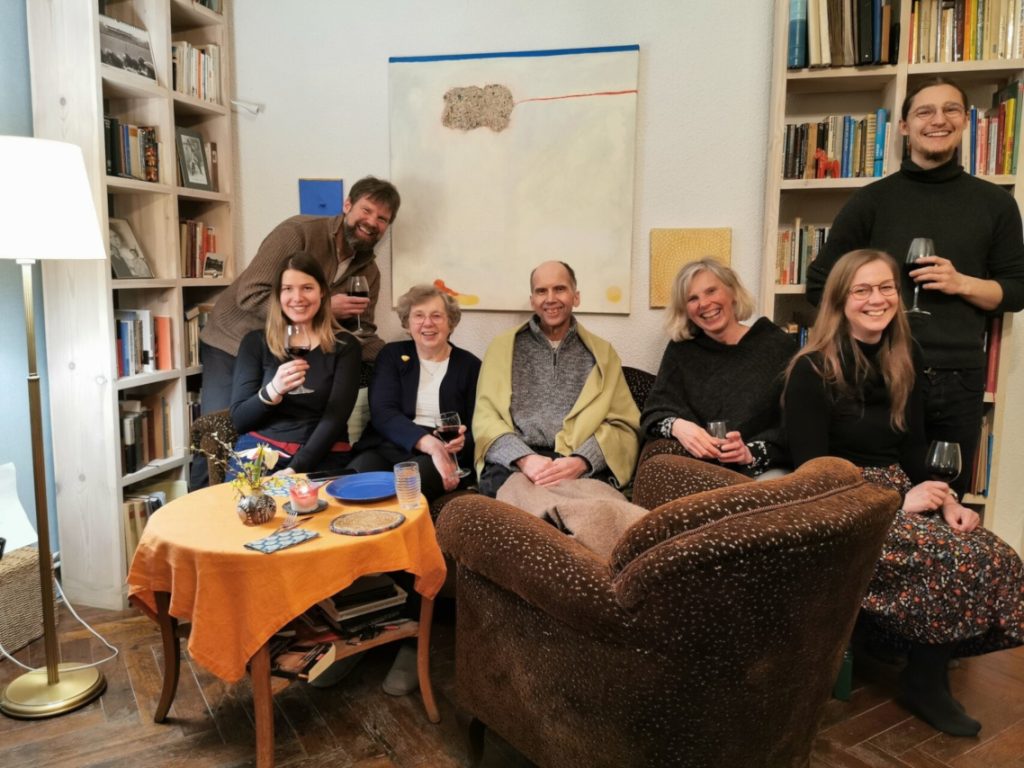
Michael Jonas, Subkommende Oldenburg des Johanniterordens
This text is an automatic translation from DeepL Translate.
In 2003, the Oldenburg sub-command of the Order of St John took over the sponsorship of a congregation in Latvia from the then Diakonisches Werk in Oldenburg. At that time, I did not even know exactly where Latvia, or even Liepaja, was located - and I knew nothing of the many historical connections between Oldenburg and Latvia.
A few weeks later, in a most stormy sea voyage, I sailed together with the Rocksien couple and a lorry full of 5.5 tons of relief supplies by ferry to Liepaja, where we arrived in the evening at 10 pm, quite exhausted and seasick. At customs there was a slim, tall, somewhat awkward-looking friendly man who greeted me warmly and with a few words guided me past the awkward customs and entry control - Latvia was not yet in the EU and the friendly man showed his competence right at the first meeting, many people in Liepaja knew him and associated him with the church.
That's how I met Pastor Martin Urdze and we liked each other immediately. This first meeting resulted in extensive activities of our sub-committee in the following years, aid transports, donations of money and goods, several individual and three group trips to Latvia, I myself was in Liepaja about twenty times. Also due to the support of the German churches, he was an uncomfortable admonisher in Latvia, but he could neither be overlooked nor cold. With great perseverance he fought for the preservation and the idea of a diaconically committed congregation and was not discouraged by failures and massive resistance. At the Synod in Riga, where women's ordination was finally abolished again and the increasingly orthodox course of the Latvian official church was confirmed, his voice and his position could not be ignored.
Now Martin Urdze passed away on 23.4.2021 after a short serious illness of a malignant disease and was buried on 1.5. 2021 in Latvia at the cemetery of Asyl Ilgi at the gates of Liepaja.
For the inmates of this asylum, where in 2003 restless people, disabled people, demented people and dying people were still being housed in wild confusion, sometimes like in a prison, he always and energetically campaigned and he was also very proud to be able to show us how the conditions had fundamentally improved 10 years later after the EU aid began, both structurally and in terms of content - quickly recognisable to us. His commitment to the sick, the weak, the handicapped and the disadvantaged in the entire region was unbelievable, he was courageous in the face of the authorities of his church and state, he did not worry about his social or financial situation, unfortunately he did not worry about himself either, he was "proverbially" neither afraid of death nor of the devil. I have rarely met a person so straightforward and convinced of the Gospel.
We owe him and his network many encounters and experiences, small nursing stations in the countryside which we were able to supply with used nursing beds, contacts with other church congregations and pastors in Latvia, guided tours through magnificent Riga, several contacts with the Ilgi asylum and its residents, a short prayer service at the memorial for the murdered Jews on the beach of Karosta.
A few days before his death, Martin Urdze informed me by email about his state of health, he was calm and in a positive mood, we were also able to speak to each other again on the phone.
The Oldenburg Sub-Commandery of the Order of St John mourns the loss of a long-time friend and partner and hopes that his life's work in Liepaja will continue.
Dr. Michael Jonas, Oldenburg
Mindaugas Kairys
Matthew 9, 36 And when he saw the people, he was grieved; for they were troubled and scattered as sheep having no shepherd. 37 Then said he unto his disciples, The harvest is great, but the labourers are few.
Dear brothers and sisters, dear friends!
It is with great sadness that I heard today that our brother Pastor Martin Urdze was called home today by our Lord Jesus Christ. Our first thought is for the family, we are with them in thoughts and prayers as mourners.
A congregation has lost its shepherd and yet may feel comforted in the assurance that the good Shepherd Jesus Christ will not leave them alone in their need. In the bringing in of the great harvest, we will greatly miss the selfless and diligent worker.
A valued colleague and friend has gone, whose advice and sharing in our common diaconal work I will sorely miss. We still had many plans for the future, but our Lord and God in His immeasurable wisdom decided otherwise.
As a theologian, pastor and tireless worker in the broad field of diaconia, Martin Urdze will remain unforgotten.
His path on earth has come to an end. We are left with the living memory and the task of continuing his work in the time that remains to us.
Rev. Mindaugas Kairys, Director of the National Association of Lutheran Diaconia in Lithuania
Nicole Rönnspieß, Diakonie Schleswig-Holstein
This text is an automatic translation from DeepL Translate.
I often think of Martin when I run my rounds in the forest….
In the midst of all the magnificent, bright green trees, there are isolated trees that have been felled or fallen by storms or lightning, whose lives came to an end too soon.
And although they lie on the ground, they give life and shelter to so many plants and animals. So they give life even after their death.
When I walk through the forest like this and look at these trees, I have to think of Martin -
how he gave security during his life, sheltering people under his "leaves",
but how even after his death, many people continue to grow and the shelter he created continues to give them protection…
like every fallen tree.
Nicole Rönnspieß
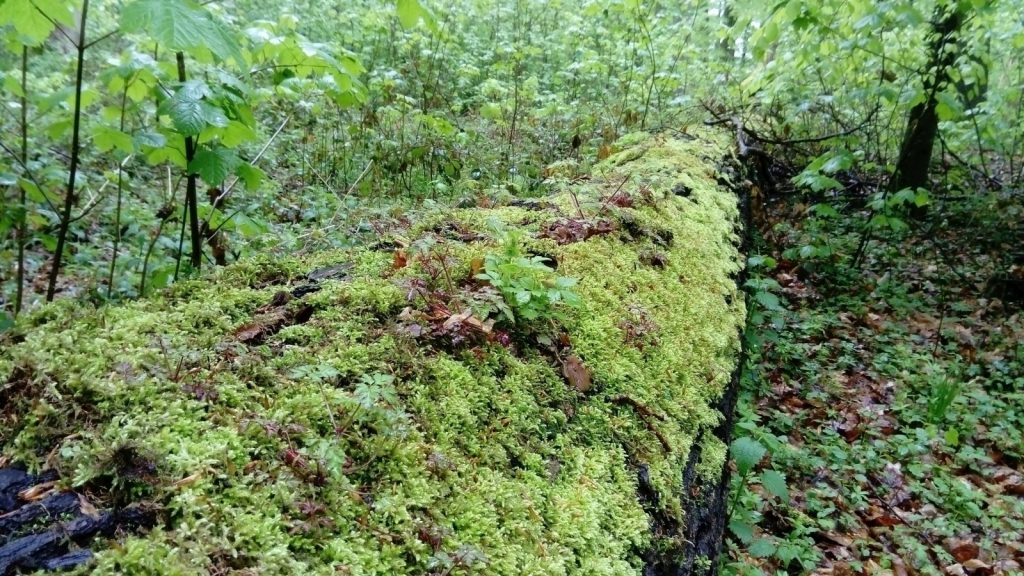
Niks Kadeģis
This text is an automatic translation from DeepL Translate.
One of my first adventures with Martins was attending a football match in his hometown VfB Oldenburg with Tom about 40 years ago. Both brothers were very supportive of the team and lived with the successes and failures of the club. During the game, I was struck by Martin's gently smiling attitude towards the team's repeated failure. I saw this gentle smiling attitude towards everyday pleasures together with seriousness in spiritual search every time I met Martins in the following decades.
Later in life, he buried my father in Liepāja with great affection. For this I would like to thank him again! I will always remember Martins for these two qualities - a sweet smile towards people and a great seriousness towards God.
Niks
Olaf Kreitsmann
This text is an automatic translation from DeepL Translate.
Our friend Jürgen touched me deeply on Friday evening with the news that our Martin has left this world.
I suffer with you and am deeply saddened by the death of the friend who is my first conscious memory in my life. In the last days and weeks I have been in constant contact with Martin via WhatsApp and knew that this moment would come. Nevertheless, the day life ends is then a certainty that makes you realise the vulnerability of our being and the power of love among friends. I try to find comfort in realising that one evening in 1980 we had already received terrible news and afterwards the gift of almost 41 years of beautiful moments was there for Martin and all his loved ones. Unbelievable creativity in a community that would not exist without Martin will remain forever in Liepaja and here in the memory of many supporters.
I will never forget the beautiful days we had during my visits to Liepaja. The wonderful wedding with Aja and Martin, which for me will always remain a symbol of a great gift from God. For me, the memory remains of so many hours and days from childhood, our youth and adulthood when I was able to experience something that unfortunately is not given to everyone. Unconditional friendship, loyalty and an almost blind trust in each other that made every meeting, even after a long time, a moment that was as if we had seen each other for the last time the day before.
For Kerstin and our children, Martin was always a part of our family when he was here, sometimes more than my siblings were.
I wish you the strength to get through these days well together. I know that Martin's place in your hearts and memories is surrounded with love and light.
I send you all the strength and confidence I have and I am with you with my heart and my thoughts.
Olaf
Raivo Bitenieks
This text is an automatic translation from DeepL Translate.
You know the burning stars,
The hand that caresses with a caress.Now your face is covered by a half chair
And the liquor like the whitest snows.None of the little ones were strangers to you
Neither in the houses nor in the street corners.A forest of souls to cherish forever,
Imprisoned within the walls of dumbness.You gave of yourself all that was stored
For body, soul, spirit.And so you go as you were told
Through the darkness and weight of nothingness.You go when the poplars bloom,
Himself weathered by Time and Eternity.But the soul weeps not, the soul sings,
For the Giver is blessed even in death.
Raivo Bitenieks
Rolf Giani
This text is an automatic translation from DeepL Translate.
It makes you very sad because it is always the people who help others and the disadvantaged who leave far too soon. There is so much heart and soul in the diaconia, so much care for the community - with many ideas for community integration, when I think of the housing project.
I hope and wish that Pastor Urdze's straightforward life's work can continue and that the forward-looking church community will be able to prevail against all obstacles.
I also hope that the Diakonie will continue and that the disadvantaged people will have a sheltered home.
In solidarity,
R. Giani
Selga Eglite
It is so sad news that Pastor Martin Urdze has passed away. My sincerest condolences on the passing of Martin Urdze to his mother, to his congregation of the Church of the Cross, Diacony members and to everybody who knew him. He was a very special pastor and he will be missed by many - helping others was related to his faith.
I met Martin Urdze in St. Anna Church when he arrived in Liepaja, Latvia in the 1990s (I cannot recall the precise date). I was very surprised that he told me that he is going to take care of disabled people. At that time I had seen only women doing that kind of work. He inspired me and my girl quides and I visited old and disabled people in Social Care Centre Iļģi.
At that time I was a leader of girl quides. Unfortunately, it was too hard for me to visit old and disabled people - all I saw there scared me a lot. After that I didn't meet Pastor Martin Urdze, my life path went in a different direction.
I am sure that his life will illuminate the path he began and left behind.
Selga Eglite
Sigita Urdze
This text is an automatic translation from DeepL Translate.
Sometimes I tell friends and acquaintances about my family. When I want to describe a very special person, I usually name Martins. I will continue to do so.
I only met Martins when I was an adult. He was always very impressive to me because he acted the way he talked. At the same time, he didn't seem horrible at all. He was so warm, so open and so understanding.
There were always football magazines being thrown around in his house. It made him so human, so approachable, so "normal". All this together made him, in a way, a moral role model for me. A role model who did not put any pressure on me - that would not have been appropriate for him; in that sense, he was a very easy role model.
Today I am sitting here, far away, in Darmstadt. And I am grateful that I have been able to get to know Martin.
Sigita
Signe
This text is an automatic translation from DeepL Translate.
When I met Martins, he was mainly Tabitha's big brother. On the occasions when we met in Oldenburg and drank hot tea together in the living room with the whole family, the conversations were often serious, theological and very impressive to me.
When I got to know Martin a little better, I discovered his quiet humour with his little laugh, his interest in football and his cool taste in music. His special, slender walk, both hands in the pockets of his corduroy trousers, was unique.
I rarely experienced Martins as a priest, but I was very grateful that he was present at my grandmother's farewell in 1996 at the cemetery in the forest of Gigi near Rucava. He found comforting, loving words and I remember the beautiful atmosphere after the service when we all sat together outside in the garden of my grandmother's house.
My thoughts are with you, my dear,
Signe
Signe’s tribute to Pastor Martin!
This text is an automatic translation from DeepL Translate.
This time…
This time is too short
To hate, to mourn, to hate,
We come to make the world pure!
To change the minds and thoughts of mankind,
To bring some back to protect -This time is too short…
So much work -
Father! Why?
So soon, I'm called Home!
Signe
Steinar Eraker
I am very sorry for the loss of Martins and I want to express my condolences to you and the family!
I also want to share that I got to know Martins in Järvenpää in 2011 and met him more or less once a year since in the LVF Conviviality ‘solidarity group’ up to Doorn/Amsterdam in 2019.
I will remember him as a sincere but openminded person with a warm smile engaged in the inclusion of the dignity of every human being.
I enjoyed his devotions and sermons where the including love of God through Christ was central.
I will cherish his memory and hope the family and close friends will find strength to bear the loss and courage to go on living in the time to come.
Greetings from Oslo, Norway
Steinar Eraker, Pastor in the Church City Mission of Oslo
Taisija Hristoļubova
This text is an automatic translation from DeepL Translate.
I met Mr Mārtiņš Urdzes in the 1990s, when Waltraute von Thiesenhausen, a benefactress of Liepāja and the initiator of the friendship with Darmstadt, visited the Ilgi Nursing Home while she was here, as she was becoming active in the social sphere. There were also large bilateral meetings, for which I was also invited as an interpreter. Even then I had a very good impression of the pastor. I also realised that he was not a stranger to the social institution and could then tell me a lot about the life of the residents and give good advice. In the following years we also met by chance at various events, including seminars. He was always kind and friendly. In the Church of the Cross, apart from the services, there was sometimes, for example, a mono-performance in German, dedicated to Easter, organised by the Goethe-Institut. There our German-Latvian members of the Liepāja German-Latvian meeting were able to participate in very large numbers and afterwards to talk to the organisers.
In my memory, there was also the Apple Festival, which was held every autumn in the church yard. I express my condolences to all the relatives of this nice and bright man on the passing away of Pastor Martins Urdzi…
Ruhe in Gott!
Taisija Hristoļubova un Liepājas vācu-latviešu tikšanās centra biedri
The residents and employees of “Iļģi” Social Care Centre
“I still have your words,
I still have your heart,
And it seems that your eyes
Still shine from every star.”
For us at the “Iļģi” branch of the Kurzeme State Social Care Centre, pastor Mārtiņš Urdze was a special person. He greeted and found time for everyone, gladly engaging in a chat or a longer conversation.
Everyone looked forward to the one day a month that Mārtiņš visited our centre so that they could attend the church service he held.
We will remember Mārtiņš as a simple, smiling, genuine, warm-hearted person......
All of the residents and employees at the “Iļģi” centre bow their heads in sorrow and express their deepest sympathy to Mārtiņš’ family.
Vaira Tempel
This text is an automatic translation from DeepL Translate.
Dear Gita,
Martin has passed away. I did not know him personally, but I knew of him from stories. I knew of his studies, of his work in the church in Liepaja, Latvia, of the deaconess centre he founded. I also knew about his illness and his strength to live and work. It is beautiful how you describe the closeness and support between your children.
I greet you and your loved ones with the words of this song
When the bells of the cemetery mourn
For those who have gone singing,
Who then can exhaust the measure of grief,
We feel a solemn joy in our hearts.But Thou who art the judge of our way,
Let the way begin and the path end.
Thou, God, who givest and takest all things,
Give us strength to hasten towards Thee.And when the bells of the grave ring softly
Sing of those who have gone,
When tears fill the eyes,
Come, O God, and give us peace in our hearts:
Without Thee the cross weighs heavy on us,
Come, God of peace, send us peace.
Sincerley,
Vaira
Lauma
Valters Korālis
This text is an automatic translation from DeepL Translate.
I met Pastor Mārtiņš Urdzi when we were both pastors and spiritual officials of the LELB (Latvian Evangelical Lutheran Church in Latvia). Then I was on the Real Estate and Finance Commission, also on the Presidium. Later, in 2008, my path and that of the LELB diverged - I became Latvia's first and now only pastor in private practice outside of religious or public organisations. Mārtiņš Urdze, on the other hand, stayed longer in that religious organisation with a naive and at times Don Quixotic idealism and hope, until he began to realise the reality of the personality cult traits of some of the leaders and other less than admirable features of the former religious organisation, so he chose LEBāL (now called LELBP - Latvian Evangelical Lutheran Church in the World).
Meanwhile, I continued and am continuing my work, he is continuing his. Now and then, albeit less often, we kept in touch. Martins was a good interlocutor. Fair-minded, sometimes very stubborn, but determined and full of energy. Not only in talk, but more in action. If we talk and talk, he knew how to listen. This is a skill that few clergy today have. He could definitely be counted among the Latvian intellectuals. Martin did not much like attending theologians' conferences with a lot of "talking it out", like being in his "work squad" where he, together with the Saviour Jesus Christ, bowed down to the lowest and most marginalised members of society. As far as I have heard or read, Martin Urdze did not strive for excessive wisdom in his sermons or for revelations of spiritual abstraction, but preached the simplicity of Christ. Moreover, it was not so much in words as in deeds, by his own example.
When I met people from Liepāja, they always regretted what had happened in the "division of property" or ownership dispute between the common church (LELB) and the local congregation, which often resulted in the division of the Latvian Lutheran community. But even in this struggle, Martins remained on the side of the minority, i.e. the local church. If he was really destined to lose, let it be with dignity and peace in the face of incomparable legal and financial superiority. For this reason, he can be counted among the most courageous pastors in Latvia today.
I feel more conservative in many theological and spiritual-practical positions, but I have watched with great admiration for many years the success of Pastor Martins Urdzes in the field of diakonia (spiritual and especially practical care of people). In spite of his success in Kurzeme and in the whole of Latvia, all of us who were his contemporaries or brothers in the ministry (and also sisters in the ministry) could witness with what humility and simplicity he accepted the brightest side of his life - the success of his pastoral work. Not all clergy are able to live out their starry hours with a calm mind…
Pastor Mārtiņš Urdzi was best known in Liepāja. He was a distinctly "working-class" pastor, who had little interest in the "high liturgy" of the church. He celebrated life with those who came to the parish house on weekday evenings to pray or share. And he shared with them. Both with the time entrusted to him by God and with the manifestations of his talent, which I have only sketched a little and mention as an honourable personality and a contemporary of his and all of us. May the people of Liepaja, Kurzeme and the whole of Latvia carry on the best of what he started! Sincerely - Pastor Valters Korālis"
Valters Korālis
Varis Bitenieks
This text is an automatic translation from DeepL Translate.
I met Martins in Liepaja in 1997 or 1998 at one of the Grobiņa pastors' district conventions in Liepaja. He didn't speak Latvian very well then, but he was energetic and someone who understood church life more than just leading worship. This was a big difference from other pastors. I liked it because it was in line with the views I had acquired at the Faculty of Theology at the University of Latvia. Martins and I had several things in common.
We both spoke German and so often shared a circle of acquaintances in theological circles. We both wore black Lutheran gowns, because in fact these are the actual office vestments of the historic Latvian Lutheran Church. We also shared the view that the interests of the local congregation were superior to the interests of the whole church, because the main life of faith takes place in the local congregation where the pastor ministers the Word and Sacraments. This is, in fact, the structure of the church that Martin Luther established. This local church life is of the greatest importance, because there people follow Christ together and by their life of faith are true witnesses of Christ in their environment. The Lutheran Church in our understanding was completely opposite in structure to the Roman Catholic Church, the Orthodox Church and other churches where there is a pyramidal church structure (a structure that divides people into "top" and "bottom" - clergy and ordinary parishioners) The fact that many churches in Latvia today still have a pyramidal structure, banning women from being pastors, we saw as a "fossil" of the communist era. Latvian society has been taught for so many years to fear Moscow, Siberia, the punishment you will receive if you are not loyal to your superiors, that people are not prepared to discuss and think about their own lives. There are even sayings like this - "He who kowtows low to a high boss is grazing in green pastures!"
Mārtiņš became a bit of a teacher for me. I considered Martins a better person and pastor than me, because he came from a Christian family with generations of pastors. I was not like that. I also thought that Martin was a better pastor than me because he came from Germany, a democratic country that had not suffered from communist ideology. He is therefore freer and more courageous than me, who was born and brought up in the USSR. He therefore had a broader and more positive view of the evangelical church in the world. In his life of faith, he was always ready to trust people much more than I was. He knew many wonderful and supportive Christians in the German church. He knew about all kinds of European pastors' conferences (Porvo, KEP, GEKE, Evangelische Partnerhilfe, etc.). He also knew about all kinds of social integration projects in the community where he could get funding or co-financing. It was all a "dark picture" for me. They didn't teach that kind of thing at the University of Applied Sciences then. It was even less known to LELB pastors.
We did a lot together. I can't describe it all. We were a good tandem. At least I thought so. But there are two events I would like to describe as a way of thanking Martin. The first one for me is from 2005. I was then serving in the LELB Grobiņa parish. I knew the pastor, Maris Sants. He came from my hometown Aizpute. Maris was like an older brother in faith to me. We had several pastoral conversations, which are very necessary for a pastor of a rural parish. Conversations in which you are listened to, understood, heard. I am very sad that Maris was expelled from the LELB. It was unjust. And then there was the gay pride of 2005, where the hatred of the crowd against the marchers was expressed. The leadership of the Latvian Christian churches had a hand in it. After that Pride, the LELB leadership also wanted to expel Juris Cālītis from the ranks of pastors and I realised that I had to defend Juris. I thought about what would happen to LELB if my teacher Juris Cālītis was expelled. I wrote two articles for the newspaper "Diena" and I hoped that other LELB pastors would also support Juris Cālītis. But it didn't happen and I soon lost my job at LELB. I considered it my duty to defend Juris. You have to be prepared to suffer for the sake of evangelical justice. Juris Cālitis was also soon expelled from the LELB, just like the pastor Māris Sants. I had small children. There were no other Lutheran congregations and churches in Latvia at that time. Mārtiņš Urdze kept in contact with me during those seven years. He called me now and then and offered me to take part in something. Other LELB pastors did not contact me at all, because I was nothing anymore. (See the sentence about "green pastures")
Martin was the only LELB pastor to do so. He considered me a pastor, even though I did not serve in any church. The German pastors did not forget me during those seven years either. In 2007, Martin arranged for me to go to Italy for the KEP pastors' conference free of charge. The four days I spent there were very important for me. I got to know Lutheran pastors and pastors from Portugal, Italy, Spain, France, the Elsa Lorraine fraction and many other countries. Those four days in Italy were very important for me. I was in a country whose language I did not know, where I did not know a single person, with no money, but in a wonderful company where I am my own and where one accepts and supports the other. This experience taught me that although you are nothing in the Latvian Evangelical Lutheran Church, you can still be a follower of Christ in Latvia. I realised that I had been thinking very narrowly. I saw that the Evangelical Church is much, much bigger than I had always thought. Everything depends on you. For that I am very grateful to Martin! This event was much more important than all the subsequent trials, the organisation of church days, the church meetings, the trip to the USA, the roof project of St John's Church in Aizpute and much more.
The other event that I think is important is the trip to Lübeck in 2010. Martins had been thinking how he could support people who make something with their own hands. So people with disabilities from Rucava, Nīca, Liepāja and other places made various home-made products: gloves, socks, candles, amber beads and other items. I also brought gloves and socks from my neighbour in Aizpute (Dobel Tante). I was proud to have thought of my neighbour and to support her. So three of us (Gatis, Inese and I) from Liepāja Diakonija took the ferry to the Martins Day market in Lübeck. It was my first time to trade and in German. To attract German buyers we also had Latvian black balsam with us. We didn't really trade. In total we traded some 320€ over several days. The Germans drank all the black balsam. It did not cover the ferry tickets or other expenses. When we returned to Latvia, Mārtiņš was still trying to make a living here and there with the home-made products he brought back. And then on Christmas Day, my neighbour Dobeltante received 220€ from the Liepāja Diakonija for her produce. I don't know how Mārtiņš settled it, but my neighbour gave all the money to her 36-year-old grandson. The next year, Martins ordered 200 pairs of socks and gloves for my neighbour. Martin got my neighbour a lot of yarn. All this activity with the haggling, the travelling to Germany, the failures, I think shows best how it was Martin's work in faith, trusting in Christ's guidance. Martin knew that this was the way to do it. He knew the main point of this work!
With these two events I wanted to show that Martins… was a man who stood his ground. A man who doesn't shadow or play a role (consciously). He was a bearer of the Light of Christ to the followers of Jesus in Liepaja. That costs a lot too! The lawsuits that the LELB took against his congregation, the various mouths and warnings and betrayals from friends and non-friends - it was all very unjust and un-Christian. Of all the LELB congregations, only one (and that was the Liepāja Cross congregation) stood against the injustice of women not being allowed to be pastors. Martin and this congregation showed that faith in Christ requires standing up against injustice. Also in the 21st century. There are witnesses of the Christian Church. Martin and his church showed that followers of Christ must show the world (even the whole church with its archbishop at its head!) that there is friendship between the sexes. This was Martin's way of following Christ.
Yes, in my life too, Martin was for some time the bearer of this Light of Christ. I knew Martin for about 20 years. Two years ago we had a difference of opinion and it broke our friendship. But I don't want to write anything about that, because Philo of Sparta already said in 4 BC: "Either speak well of the dead or nothing!"
May Martin have peace in the garden of God, where it is said in Scripture: "death shall be no more, neither sorrow, nor crying, nor pain shall be anymore; for what has been is gone. All things have become new!"
Varis Bitenieks / Valtaiķu un Snēpeles autonomo evaņģēliski luterisko draudžu mācītājs
Waltraut und Wolter v. Tiesenhausen
This text is an automatic translation from DeepL Translate.
Rev. Martins Urdze was a "rock of strength", a fighter and champion for God with soft tones. His humour and laughter was always contagious and comforting even in the most difficult situations. An irreplaceable advisor for us - and advocate for the poor, the elderly and people with disabilities for many years. We say goodbye with love and gratitude !"
Waltraut und Wolter v. Tiesenhausen
